- Nutrients in Plants vs. Animals
- How Plants Defend Themselves
- The Most Common Plant Toxins
- The Most Toxic Plants
- The Least Toxic Plants
- How to Make Plants More Nutritious
- Why Vegan Diets Are Not Healthy
- The Blue Zone Myth
- How I Transitioned to an Animal-Based Diet
- Frequently Asked Questions
- Where to Find More Information
- Why You Should Remove (Most) Plants from Your Diet
Everyone “knows” that fruits and veggies are an excellent source of micronutrients, which are the vitamins, minerals and other phytonutrients that our bodies need to thrive.
After all, we’ve been taught to make plants a significant part of each meal and to try and consume a variety of different fruits and veggies, a strategy known as “eating the rainbow.”
Certain plants are even hailed as superfoods because they’re supposed to have incredibly high concentrations of micronutrients and antioxidants. Examples include broccoli, kale and other leafy greens.

But guess what? Like much of what we’ve been taught about nutrition, there are some serious problems with this way of eating.
These problems include the fact that most of the nutrients in plants are poorly absorbed by the body, as well as the fact that all plants have chemical defense mechanisms that are meant to deter animals and humans from eating them.
One category of those defense chemicals is called antinutrients, which can prevent the body from absorbing the nutrients contained in food. Some antinutrients can even make you sick.
This article explains the evolutionary and scientific rationale behind removing (most) plants from your diet. I’ll dive into the differences between plant and animal protein, highlight the best sources of nutrients for humans, and briefly cover the moral and environmental aspects of eating animals vs. plants.
Additionally, I’ll share methods (such as fermentation) that you can leverage to make certain plant foods less toxic and increase your body’s ability to absorb more of their nutrients. By using these methods, you can continue to enjoy certain plants without inflicting too much damage on your health.
Nutrients in Plants vs. Animals
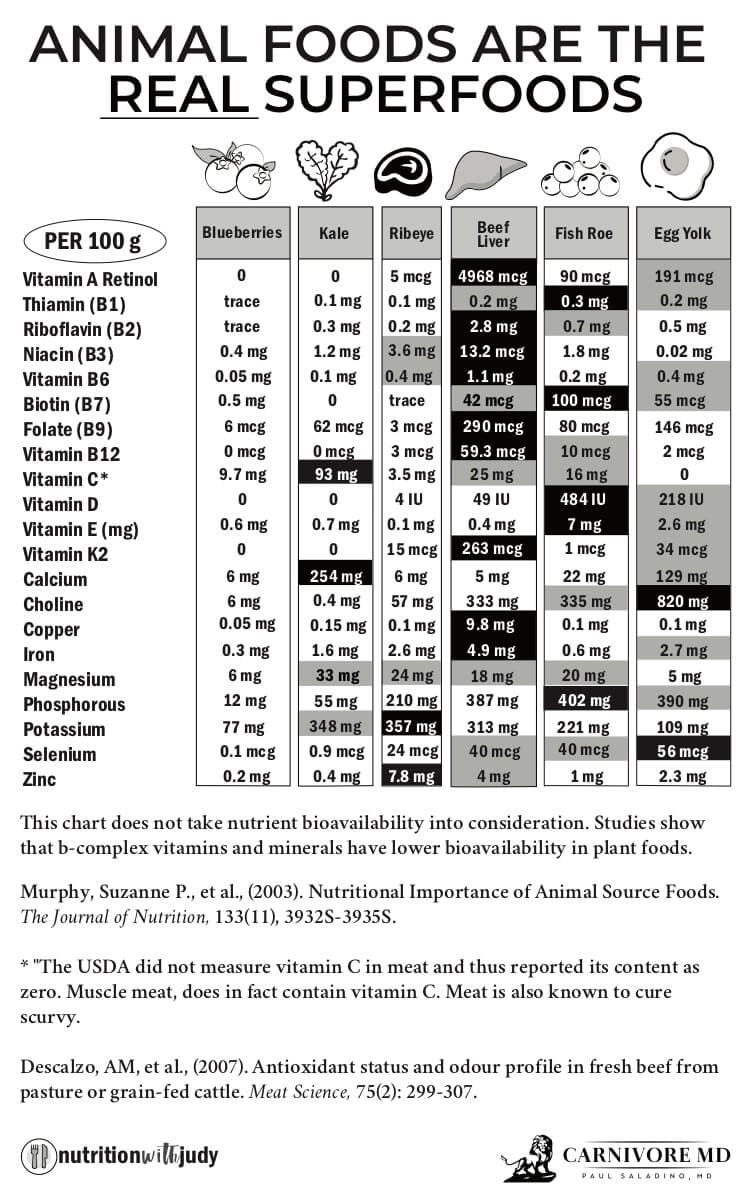
Are vegetables bad for you? In practice, plants are an inferior source of micronutrients (vitamins and minerals) compared to animals.
This is true for several reasons:
- There are some essential vitamins that do not exist in plants at all.
- Some of the vitamins in plants have to be converted before the body can use them, reducing their bioavailability.
- Antinutrients prevent the body from absorbing many of the vitamins and minerals found in plants.
- Plant protein has an incomplete amino acid profile and is poorly absorbed.
- Most plants contain unfavorable ratios of certain fatty acids, including omega-3 and omega-6.
So let’s talk more about these issues and look at some examples.
Essential Nutrients Missing in Plants
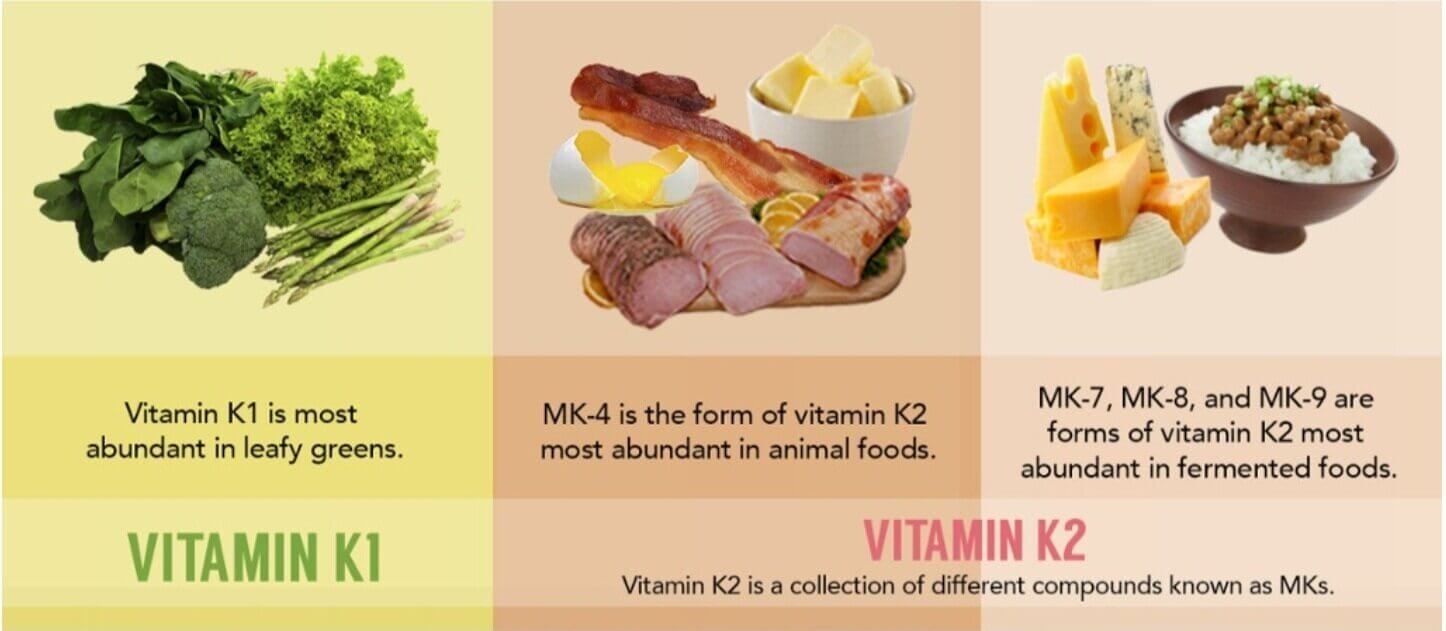
As mentioned above, there are several essential and non-essential nutrients — such as vitamins, minerals and fatty acids — that don’t exist in plants at all. In other words, we have to get them from animal sources.
Examples include:
- There is no reliable source of vitamin B12 in plants. That’s why many vegans are deficient in this essential micronutrient (and why they try to compensate by consuming highly-processed junk food fortified with synthetic vitamin B12). On the other hand, organ meat (and liver in particular) is an excellent source of B12.
- Vitamin D3 doesn’t exist in the parts of plants fit for human consumption, with the exception of microalgae. As a result, we need to get most of it from the sun and animals (especially fatty fish).
- There are several versions of vitamin K (including K1) and several versions of K2 (MK-4, MK-7, etc.). Plants have vitamin K1, which is poorly absorbed by the body, especially in the absence of the fat that plants lack. To get vitamin K2 from plants, you need to ferment them first.
- Arguably the most important form of vitamin K2 (the version called MK-4) is only in animal products (and especially liver).
- Creatine plays an important role in muscle and brain function, and while the liver, pancreas and kidneys can make up to one gram of creatine per day, studies have shown that people who follow a plant-based diet have much lower levels of this molecule. Without supplementation, low creatine levels can lead to decreased physical and mental performance.
- Carnosine is a non-essential amino acid that’s responsible for muscle function. The body can make some carnosine from the amino acids histidine and beta-alanine, but studies have shown that without supplementation, vegetarians have significantly lower levels of carnosine in their muscles (which can lead to decreased endurance and lower muscle mass).
- Docosahexaenoic acid (DHA) is an essential omega-3 fatty acid that’s found in fatty fish, fish oil and microalgae. While some DHA can be made from ALA (another omega-3 fatty acid found in plants), the conversion from AHA to DHA is incredibly inefficient and may not increase DHA blood levels sufficiently. So plant-eaters must supplement with algae oil or synthetic versions of DHA to get enough of this omega-3 fatty acid into their diet.
- Taurine is a sulfur compound that’s only found in animal-based foods, including fish, seafood, meat, poultry and dairy. The exact role that taurine plays in the human body isn’t entirely clear, but it appears to support muscle function, bile salt formation, and the immune system. However, one study discovered that vegetarians often suffer from an autoimmune disorder called platelet aggregation abnormality due to taurine deficiency.
As a result, strict veganism or vegetarianism will most likely lead to nutrient deficiencies, thus increasing the risk of osteoporosis, anemia, lethargy, hair loss, neurological symptoms and more.
In fact, studies have shown that 84% of plant eaters return to consuming meat (many due to health issues).
I had a strictly vegan co-worker in her mid-30s who tripped on an uneven road and broke her hip — an issue most adults don’t have to worry about until they’re in their late 70s or beyond. Of course, this is anecdotal evidence. But if I had to guess, I’d say she was malnourished due to her dietary patterns, and that’s why her bones broke so easily.
Low Bioavailability
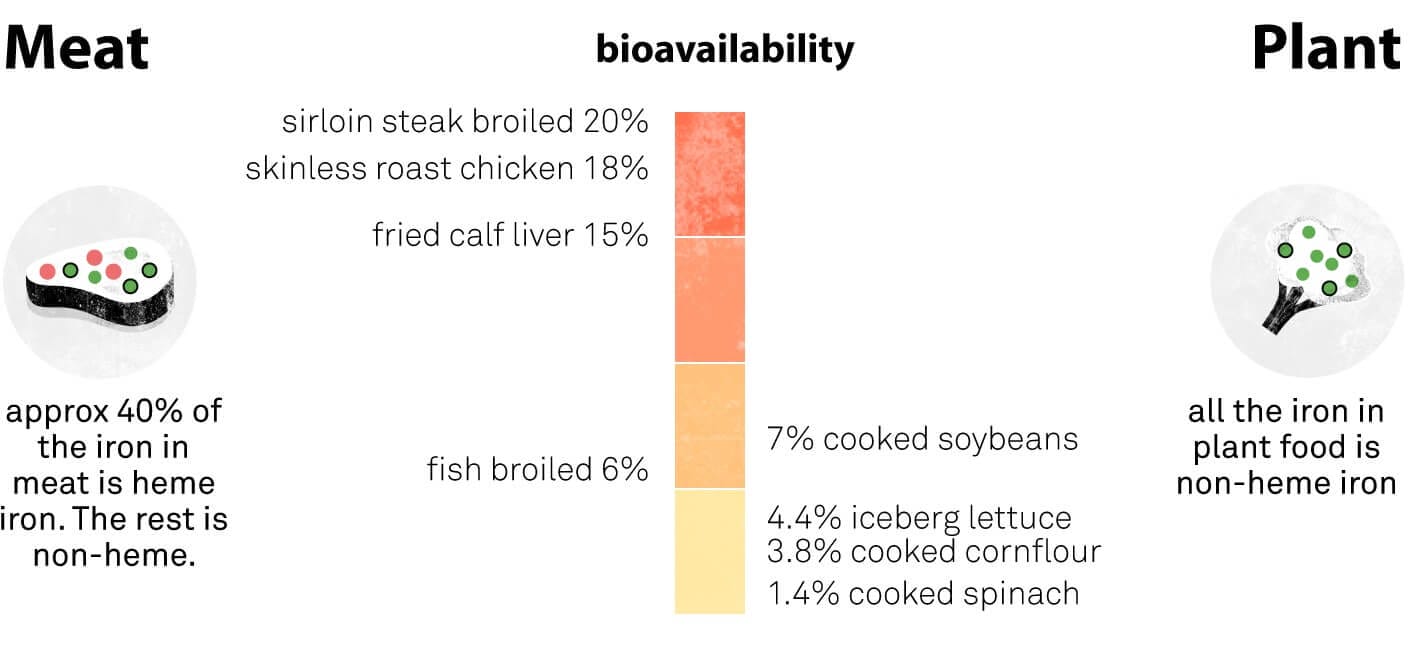
Many of the vitamins and minerals in plants exist in variations that the body can’t readily use without first converting them, thus decreasing their bioavailability and effectiveness.
Here are a couple of examples:
- Vitamin A: Plants only have precursors of vitamin A (e.g., alpha carotene, beta carotene, beta cryptoxanthin) that must be converted before the body can use it. Organ meats, such as liver, are loaded with a ready-to-use version of this fat-soluble vitamin (retinol) that doesn’t have to be converted first.
- Iron: Non-heme iron (the type of iron found in plants) is three times less bioavailable than the heme iron found in muscle and organ meats (especially spleen and liver).
But before you continue reading, just think about this for a moment: how can a (plant-based) diet that requires supplementation with (synthetic) vitamins and minerals to cover nutritional gaps be ideal for anyone? That doesn’t make any sense to me.
Plant Protein vs. Animal Protein
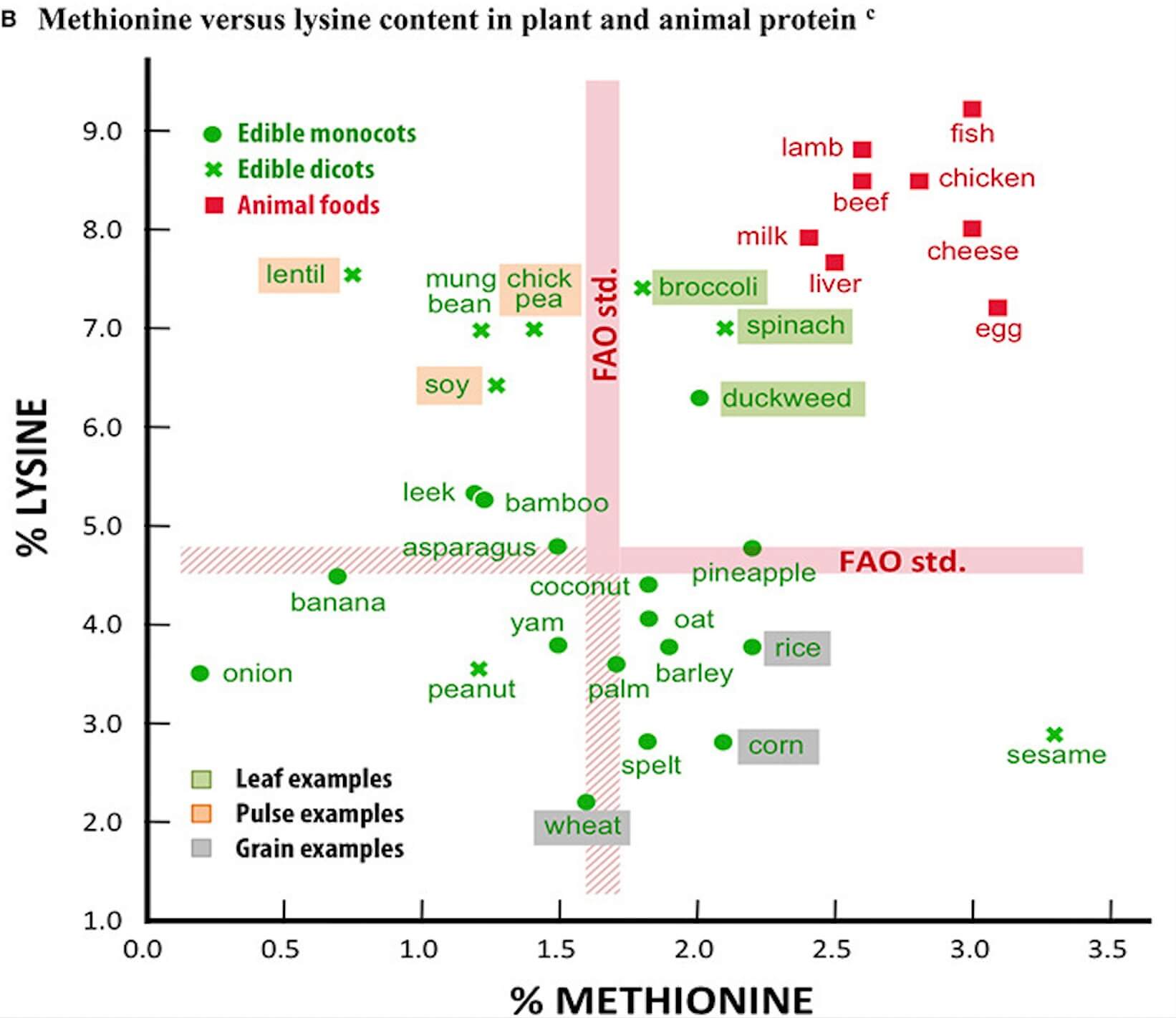
Amino acids are the building blocks of protein. While the body can make certain amino acids, there are others (called essential amino acids) that the body can’t make. We have to get those from food.
The problem is that plant-based protein has an incomplete amino acid profile, making it hard to obtain all the essential amino acids from plant-based sources.
Additionally, plant-based protein has much lower bioavailability than animal protein, which means the body absorbs fewer essential amino acids from plants than from animal sources.
In fact, a study from 2019 concluded that, “plant-based proteins have less of an anabolic effect than animal proteins due to their lower digestibility, lower essential amino acid content (especially leucine), and deficiency in other essential amino acids, such as sulfur amino acids or lysine. Thus, plant amino acids are directed toward oxidation rather than used for muscle protein synthesis.”
Omega-3 vs. Omega-6 Ratio
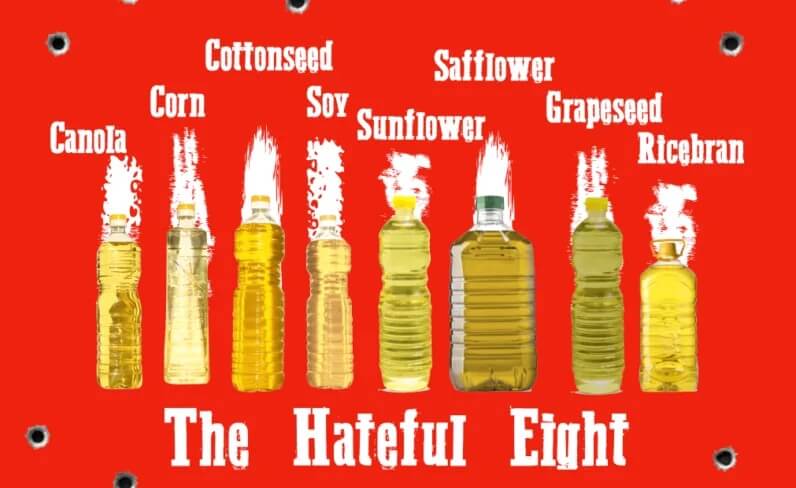
Both omega-3 and omega-6 are polyunsaturated fatty acids that play crucial roles in the human body, supporting brain function, promoting skin and hair growth, regulating the metabolism, maintaining the reproductive system and more.
The problem is that omega-6 is also pro-inflammatory. That can become an issue if you consume significantly more omega-6 than omega-3.
Our ancestors maintained a relatively balanced ratio of dietary omega-3 to omega-6. That balance started getting out of whack with the introduction of industrial seed oils and the overconsumption of plant foods that are naturally high in omega-6, including nuts and seeds.
Note that meat from grain-fed animals has a less-favorable ratio of omega-3 to omega-6 than meat from grass-fed animals. That’s why I consume pasture-raised meats whenever possible.
To learn more about what types of fat I consume the most of, check out my article comparing saturated vs. polyunsaturated fatty acids.
Nutrients in Animals
Meat from properly-raised animals has none of the issues associated with the poor absorbability and bioavailability of plant nutrients. In fact, if you maintain a nose-to-tail animal-based diet, you’ll get all the nutrients your body needs in the most bioavailable form possible. More importantly, you won’t have to worry about any of the toxins commonly found in plants.
Most Plants Don’t Want to Be Eaten
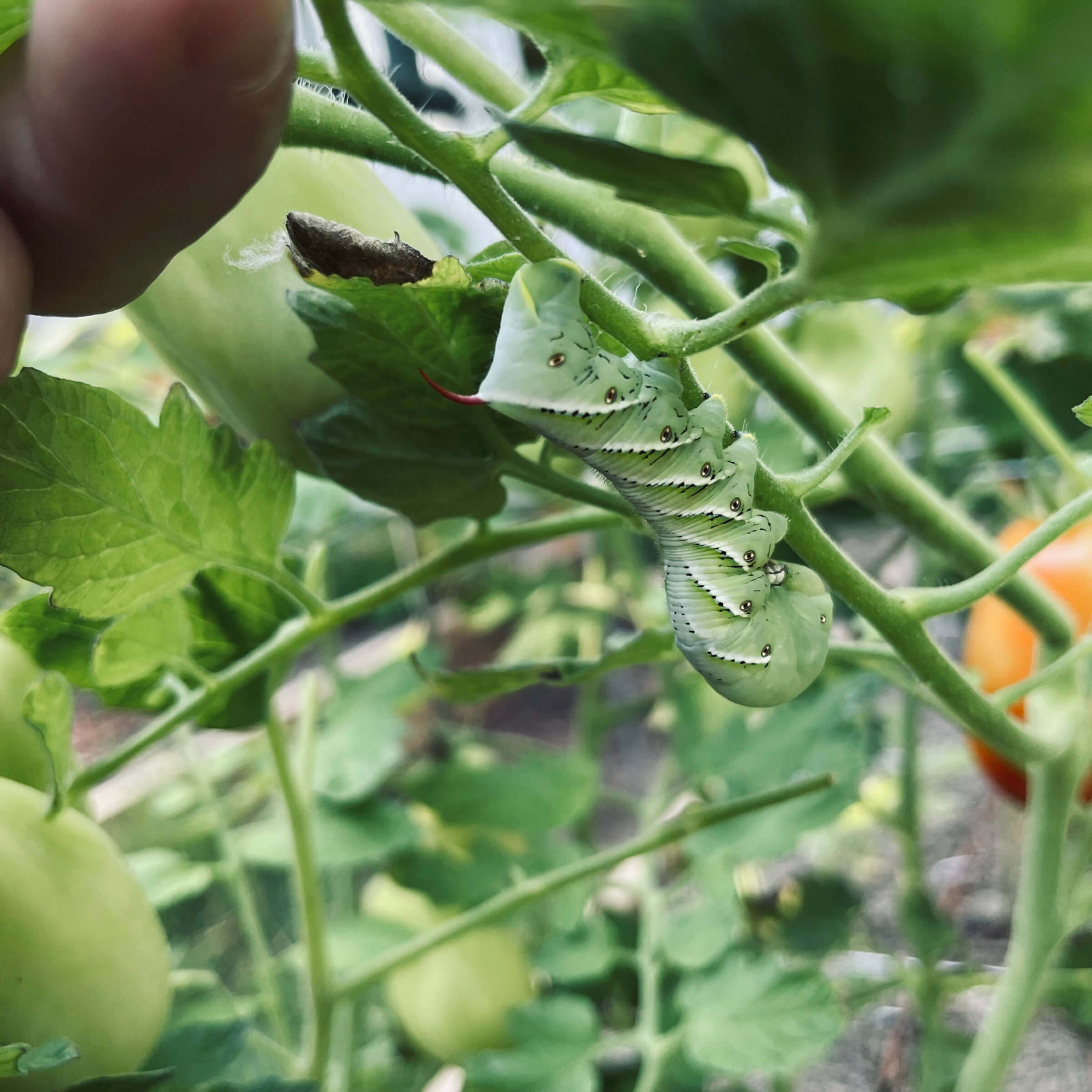
Neither animals nor plants want to be eaten — unless it’s to their advantage (we’ll get to that in a moment).
Animals fight or run when you try to kill them. But plants can’t run, and their ability to fight is limited to the use of chemical weapons in the form of toxins, inflammatory proteins, enzyme inhibitors (also known as antinutrients) and (sometimes) thorns.
Unsurprisingly, plants concentrate these toxins in vital parts of their structure, including their seeds, leaves, stems and skin.
Let me give you three real-life examples of how powerful the defense mechanisms of certain plants are:
- Some plants can respond to leaf vibrations by releasing chemicals when they sense they’re being chewed on by insects.
- Some plants even release chemicals that turn caterpillars into cannibals (the caterpillars become disinterested in eating leaves…).
- Some caterpillar-damaged plants protect themselves by releasing chemicals that attract parasitic wasps (which eat the insects).
That’s crazy but impressive, and an illustration of the strength of plants’ defenses.
Note that some plants want you to consume their fruit, so that you can spread their seeds and help the plant proliferate. That’s why certain plants, including many sweet fruits, are healthier for humans than others.
In other words, plant toxicity should be viewed on a spectrum ranging from the least-toxic to the most-toxic plants.
Does all this mean you should never eat any plants ever again? Not necessarily. But I encourage you to carefully choose the plants you make a part of your regular diet, and to learn about the critical role food preparation plays in making plants less toxic.
To give you an idea of why certain plants are better for human consumption than others, let’s take a look at the most common plant toxins and how they interfere with our metabolism.
The Most Common Plant Toxins
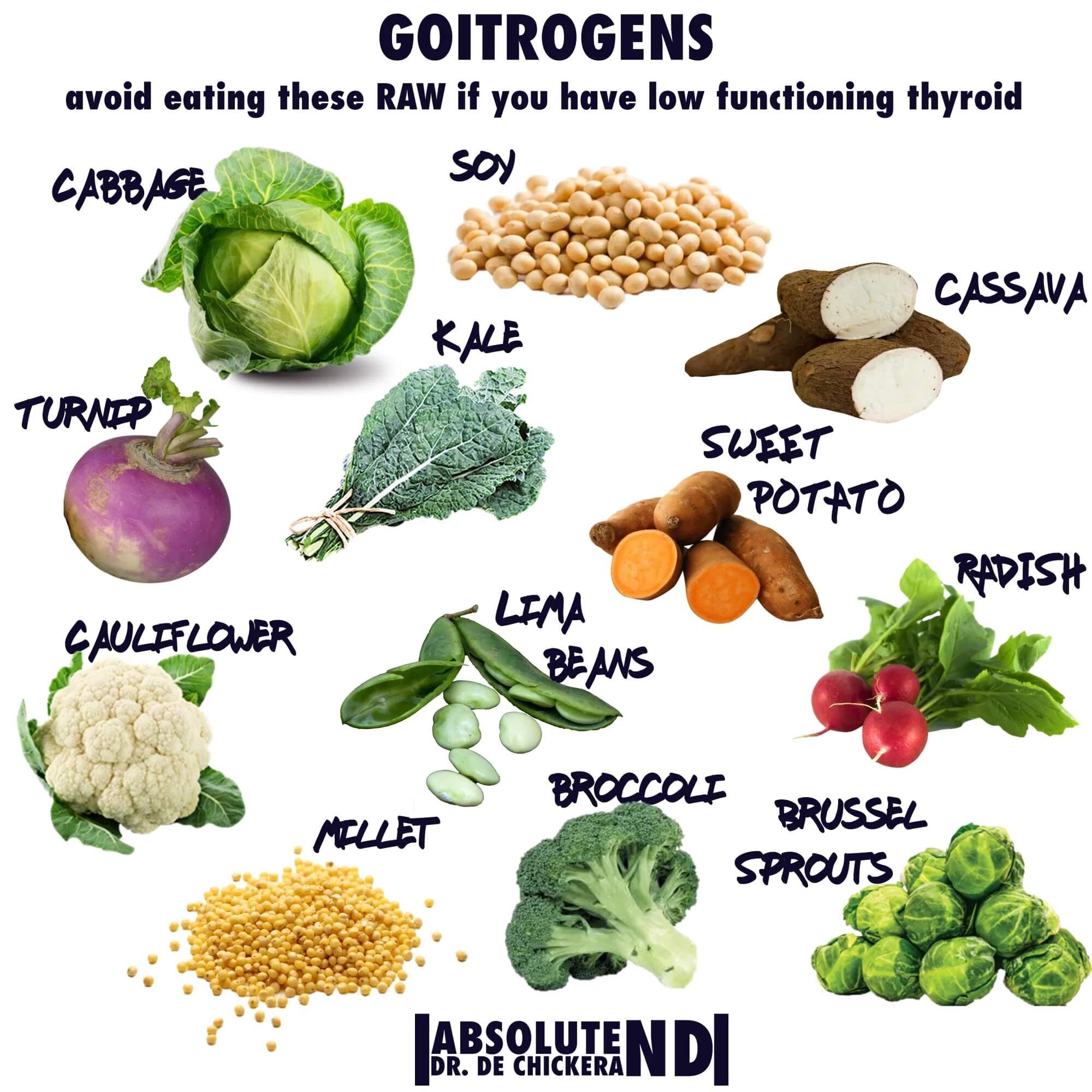
The list of toxins found in plants (called phytotoxins) is long, so here’s an overview of some of the most prevalent ones:
- Antinutrients (or enzyme inhibitors)
- Goitrogens
- Heavy metals
- Neurotoxins and carcinogens
- Phytoestrogens
Antinutrients

Unlike nutrients that provide nourishment, antinutrients block the absorption of individual proteins, vitamins and minerals. They can also create holes in your intestinal walls, leading to increased intestinal permeability (which is a fancy term for a leaky gut).
A leaky gut allows undigested food residue (e.g., proteins) to enter the bloodstream, causing the immune system to attack the foreign invaders. If you don’t remove the offending foods from your diet, this leads to chronic inflammation and autoimmune issues such as rheumatoid arthritis.
The consumption of antinutrients can also lead to mineral deficiencies (particularly if you have a diet low in organ meats).
Some of the most common antinutrients include:
- Glucosinolates
- Gluten
- Lectins
- Oxalates
- Phytates or phytic acid
- Saponins
- Tannins
- Trypsin inhibitors
For a complete review of antinutrients in plants, check out this in-depth scientific paper. If you don’t want to read the entire paper, here’s an overview of the most common antinutrients and why you want to avoid them.
Glucosinolates
Glucosinolates are compounds found in cruciferous vegetables like Brussels sprouts and cabbage. Glucosinolates prevent the body from absorbing iodine, flavonoids, and minerals such as iron and zinc.
Gluten
Most health foodies are aware of the adverse effects of this antinutrient. Gluten is found primarily in wheat, barley and rye. Based on statistics, some scientists estimate that up to 13% of the domestic population is sensitive to gluten (non-celiac gluten sensitivity).
According to Dr. Fasano, a pediatric gastroenterologist and researcher, gluten sensitivity potentially affects far more people than celiac disease. He estimates about 6% to 7% of the U.S. population may be gluten-sensitive, meaning some 20 million people in the United States alone could have the condition.
That’s much more than the 1% of people who are thought to suffer from celiac disease.
Lectins
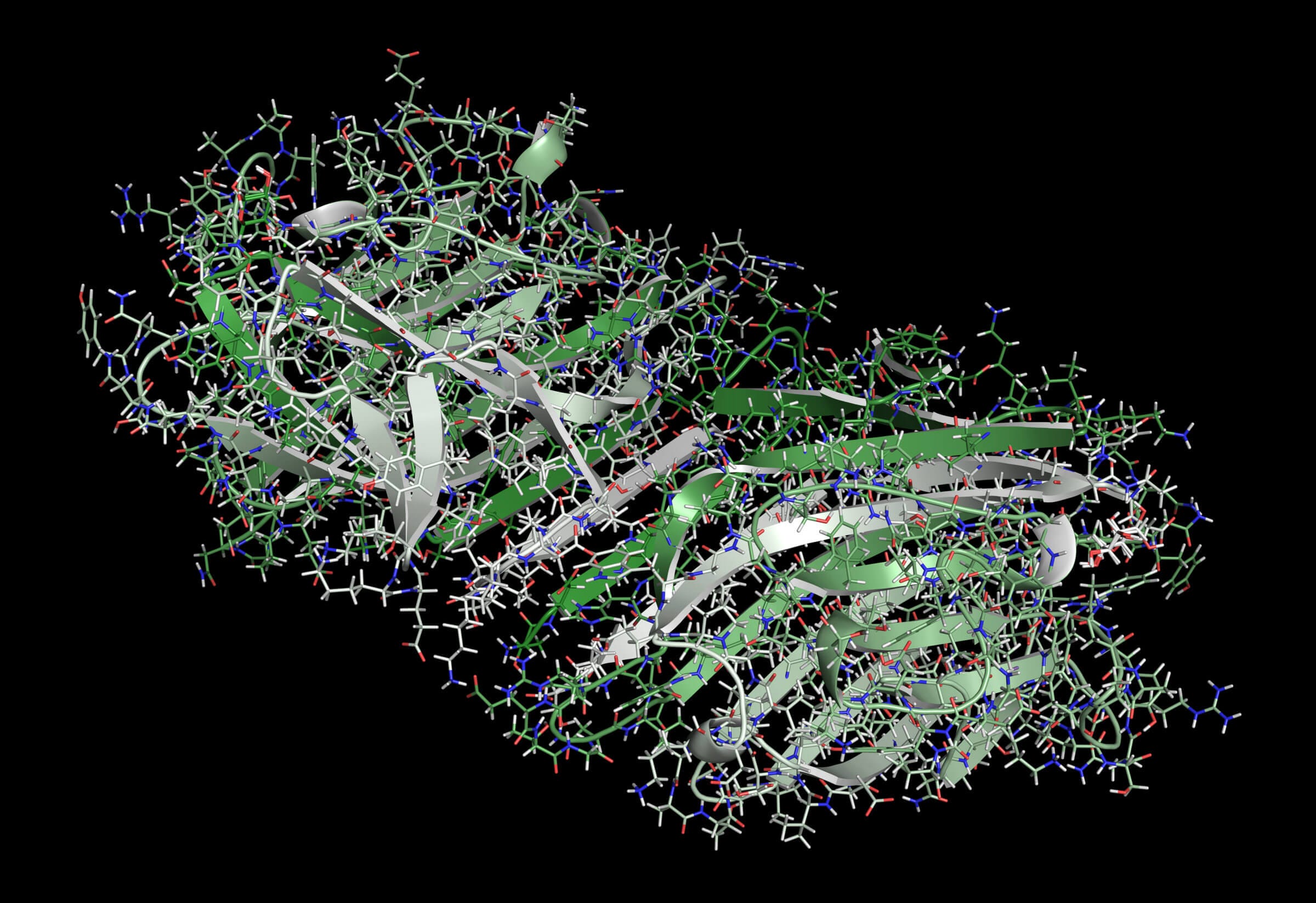
You’ve probably heard about lectins. Eating lectin-free foods is becoming a “thing,” just like eating gluten-free.
Lectins are naturally-occurring proteins found in a variety of foods. They occur in higher concentrations in legumes and grains, and are most commonly found in the section of a seed that becomes a leaf after sprouting occurs.
One of the problems with lectins is that they can cause a leaky gut (also known as intestinal permeability).
When you eat foods containing too many of these proteins, they bind to cells in your gut wall. This punctures your gut wall and creates holes, through which your gut’s contents can leak — unfiltered — into your bloodstream (enabling inflammatory pathways).
We already know that increased intestinal permeability plays a role in certain gastrointestinal conditions such as celiac disease, Crohn’s disease, and irritable bowel syndrome. The biggest question is whether or not a leaky gut may cause problems elsewhere in the body. Some studies show that leaky gut may be associated with other autoimmune diseases (lupus, Type 1 diabetes, multiple sclerosis), chronic fatigue syndrome, fibromyalgia, arthritis, allergies, asthma, acne, obesity, and even mental illness. However, we do not yet have clinical studies in humans showing such a cause and effect.
— Marcelo Campos, MD – Harvard Health
While the studies referenced by Dr. Campos correlated those findings to Type 1 diabetes, other diseases (such as Crohn’s disease and coeliac disease) followed a similar pattern.
Another study, conducted by researchers at the University of Alberta, concluded that, “in several autoimmune conditions it appears that increased permeability is a constant and early feature of the disease process. Furthermore, it is becoming increasingly apparent that in some conditions increased permeability is critical to the development of disease as if it is abrogated the disease does not develop.”
Oxalates
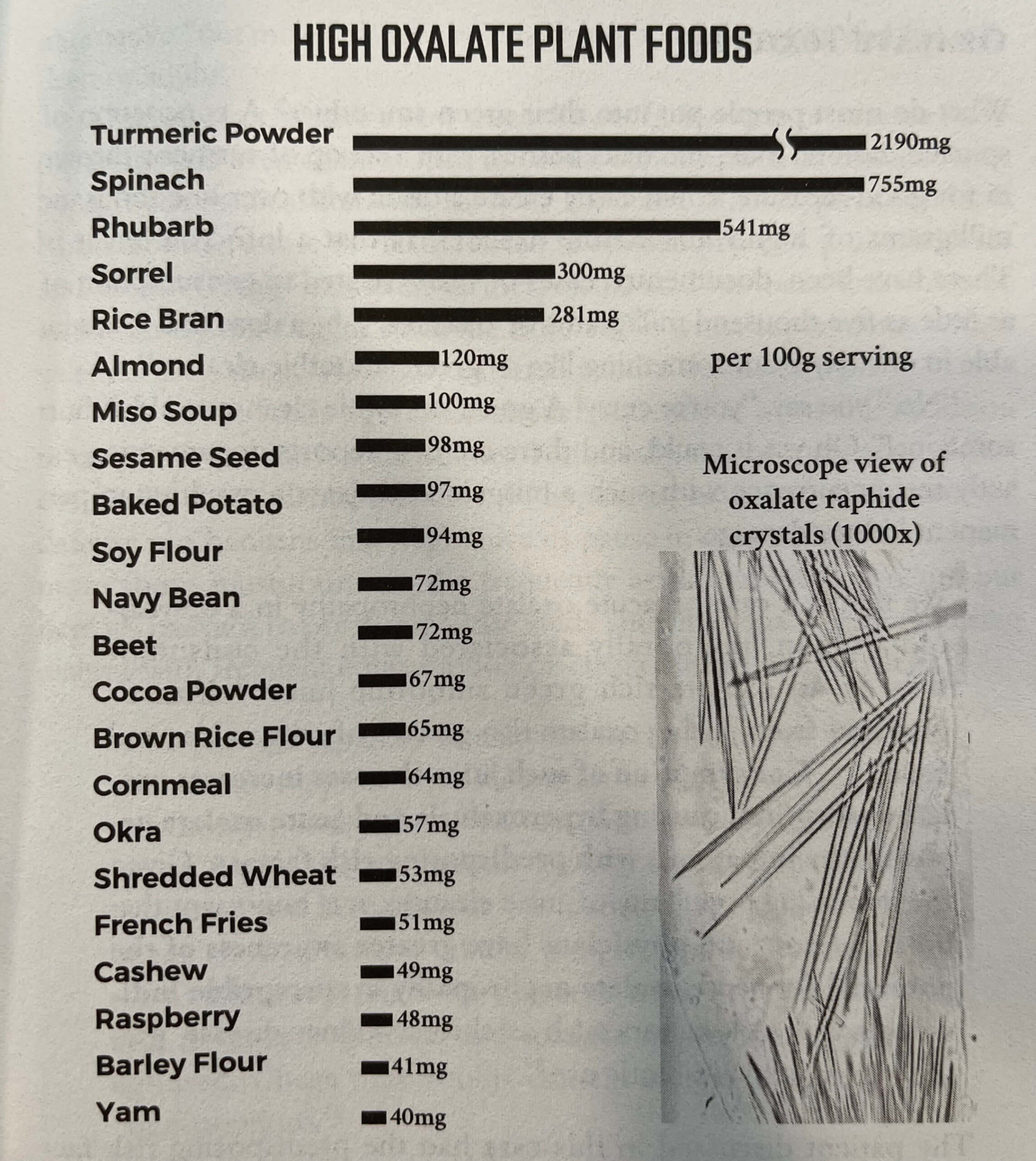
Oxalates are found in plant-based foods like spinach, rhubarb, rice and almonds. They bind to calcium, preventing the body from absorbing this vital nutrient.
If your muscles are not absorbing calcium, you will experience muscle pain. Also, oxalate from the diet binds to unused calcium and accumulates in the kidneys, causing kidney stones.
If you suffer from kidney stones, your doctor likely told you to reduce your salt and animal protein intake. Considering that early humans predominantly consumed animal protein, along with the lack of evidence that early humans suffered from chronic kidney issues, I think that advice is misguided. Instead, I strongly believe that reducing your intake of oxalate-containing vegetables is the much better approach.
Other potential consequences of calcium malabsorption include osteoporosis, fatigue and inflammatory conditions such as eczema.
Note that some of the least-toxic foods I recommend below also contain oxalates, but in lower amounts. However, if you’re metabolically unhealthy, even small amounts of oxalates might cause issues for you.
Phytates or Phytic Acid
Phytates are found in the hulls of whole grains, seeds and legumes (such as soybeans and peanuts). Phytates also bind to essential dietary minerals, including calcium, magnesium, iron, copper and zinc. This makes them unavailable for the body to use.
Saponins

Saponins are mainly found in legume plants. The name “saponin” comes from this antinutrient’s ability to foam up like soap when exposed to liquids (like gastric fluids). Like lectins, some saponins can bind to the gut and increase intestinal permeability. They also bind to zinc, and impair both protein digestion and the uptake of several vitamins and minerals.
Tannins
You may have heard of tannins as the element that gives wine its dry taste.
Tannins are naturally-occurring polyphenols. You can find them in various plants, seeds, bark, wood, leaves and fruit skins.
They’re antinutrients because they inhibit the absorption of iron.
Trypsin Inhibitors
Trypsin inhibitors are proteins that block trypsin activity. Trypsin is one of the digestive enzymes involved in the digestion and absorption of protein. Coincidentally, most trypsin inhibitors are found in grain legumes (e.g., peas and peanuts), which constitute a significant source of protein for vegans.
These inhibitors are classified as an antinutrient because they prevent our bodies from digesting and beneficially using protein.
Other Antinutrients
Beyond the most important enzyme inhibitors mentioned above, here are a few more antinutrients (and foods containing them):
- Allicin and mustard oil: Onions, shallots, leeks, chives, scallions and garlic.
- Alpha-amylase inhibitors: Grains, legumes, nut skins and stevia leaves.
- Avidin: Egg white (one of the reasons why I often eat the yolk only).
- Calcitriol, solanine and nicotine: Green potatoes, eggplant, peppers, tomatoes and goji berries.
- Cyanide: Beans and fruit pits.
- Salicylates: Berries, dried fruits, herbs and spices.
- Oligosaccharides: Legumes.
Keep in mind that the foods mentioned above contain various amounts of these antinutrients and you might have a stronger reaction to some than others.
In other words, I’m not suggesting you completely remove all of these foods from your diet, but rather that you pay attention to how you feel after consuming them.
For example, I don’t appear to have any adverse reaction to egg whites (though I often still stick with the yolk).
Goitrogens
Goitrogens are a group of chemicals that suppress the function of the thyroid gland by interfering with iodine uptake, an important mineral needed to make thyroid hormone.
The foods with the highest levels of goitrogens include bok choy, broccoli, Brussels sprouts, cabbage, cauliflower, collard greens, horseradish and kale.
In other words, many of the so-called “superfoods.”
Heavy Metals
The contamination of soil with heavy metals is a problem that most countries have to deal with. The issue is that heavy metals — including arsenic, cadmium, chromium and lead (to name a few) — don’t stay in the soil; they get absorbed by plants and then end up in our food chain, regardless of whether the plant was grown organically or using synthetic herbicides or pesticides.
While it’s certainly true that heavy metals can also accumulate in the tissue of animals (much as they accumulate in human tissue), studies (see here and here) have shown that people who follow a predominantly plant-based diet have higher blood concentrations of heavy metals.
Neurotoxins and Carcinogens
Did you know that castor beans are a natural source of ricin, a well-known neurotoxin that inhibits protein synthesis and can lead to death within hours?
I admit, that’s a rather extreme example. After all, not many people use castor beans to make chili con carne.
But even regular beans and potatoes are highly toxic when consumed raw, and can cause severe illness or death. Additionally, many plants (such as grains and legumes) are contaminated by aflatoxins, which are produced by a type of mold that grows on tree nuts, seeds, maize and other cereals, and which is known to cause cancer by damaging human cells and DNA.
That’s why I strongly recommend avoiding grains and legumes, including peanuts: because mycotoxins (such as aflatoxin) grow in damp and dark places, like the massive grain and peanut storage containers used on monoculture farms.
Phytoestrogens
Phytoestrogens are plant-based chemicals that mimic the sex hormone estrogen. I wrote at length about the issues associated with xenoestrogens and their negative impact on our reproductive health and metabolism, so check it out if you’d like to learn more.
The Most Toxic Plants
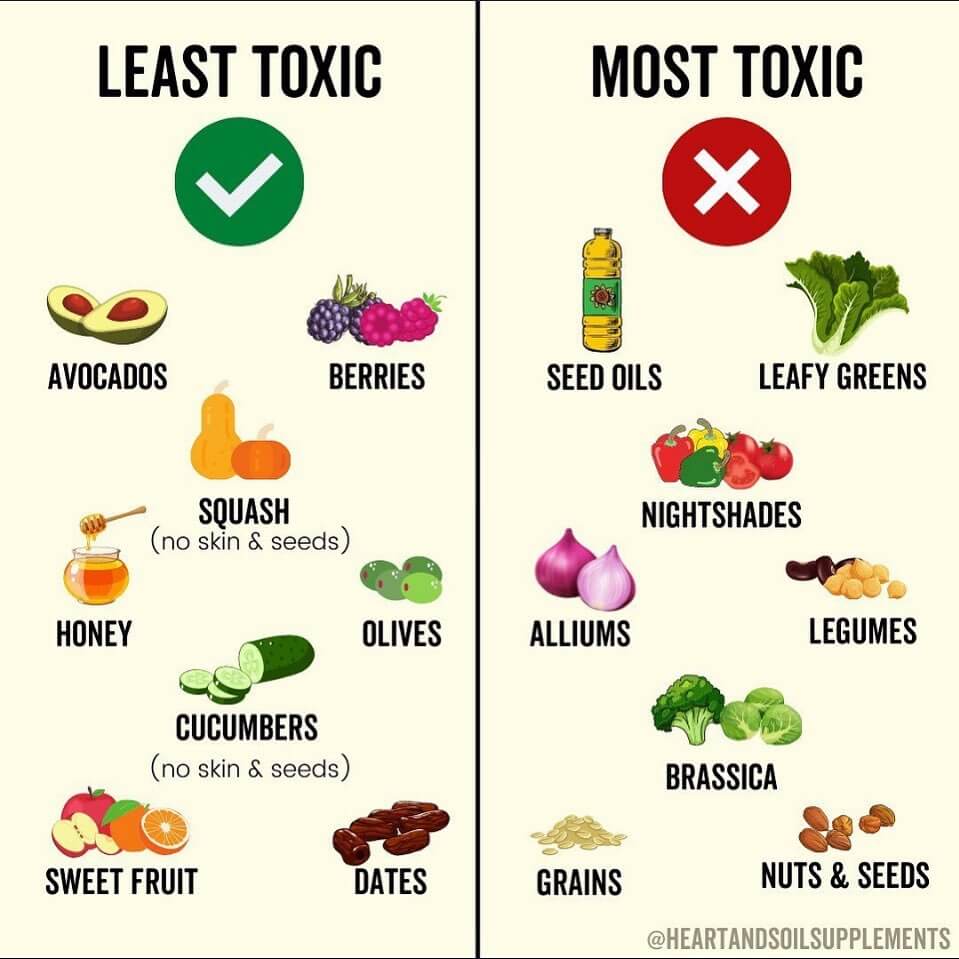
So now that we’ve covered many of the issues associated with plants, here’s a list of the most toxic plants you should avoid:
- Vegetables (and fruits)
- Alliums
- Cruciferous vegetables
- Leafy greens
- Nightshades
- Legumes
- Grains
- Nuts and seeds
Besides traditional vegetables (some of which are technically fruits), grains, legumes, nuts and seeds are also rich sources of antinutrients and other toxins. That’s why I’ve decided to include them here as well.
Vegetables (and Fruits)
Most vegetables contain a variety of toxins that can be detrimental to your health. For example, raw cruciferous vegetables such as kale, radishes, cauliflower and broccoli, as well as leafy greens such as spinach and parsley, contain the antinutrient oxalic acid.
Oxalates can lead to the formation of kidney stones and hinder the absorption of nutrients.
Tomatoes, potatoes, peppers and eggplants (all part of the nightshade family), as well as cruciferous vegetables (such as broccoli, Brussels sprouts and cabbage) and alliums (including onions, garlic, shallots, leeks and scallions) contain considerable amounts of antinutrients and should thus be avoided.
Most nightshades are technically fruits, not vegetables!
The good news is that you can reduce the soluble oxalate content of some of these vegetables by cooking them. For example, studies have shown that boiling reduces the soluble oxalate content of spinach, carrots, beetroot, white beans, red beans and soybeans by 15-66%.
Steaming is less effective, reducing the amount of oxalates by 5-53%. That’s because steaming preserves not only nutrients but also antinutrients and other toxins.
The key here is to use water and heat to allow soluble oxalates to leach out of the plant before draining it. That’s why boiling is more effective than steaming or sauteing.
To reduce the toxic load of some of the veggies that are often consumed raw, including cucumbers, tomatoes and peppers, I recommend removing the skin and seeds, as these parts of the plants contain the highest concentrations of toxins.
No matter what, I definitely recommend avoiding the consumption of raw and cooked spinach, rhubarb, kale, broccoli and other leafy greens. While some of these plants are popular ingredients in supposedly “healthy” smoothies, they’re loaded with oxalates that wreak havoc in your body and can even lead to the formation of kidney stones.
For example, if you follow a standard American diet, you likely ingest between 200 and 300 milligrams of oxalates per day. In comparison, one serving of cooked spinach has a whopping 755 mg of oxalates, closely followed by raw spinach, rhubarb and rice bran.
Legumes
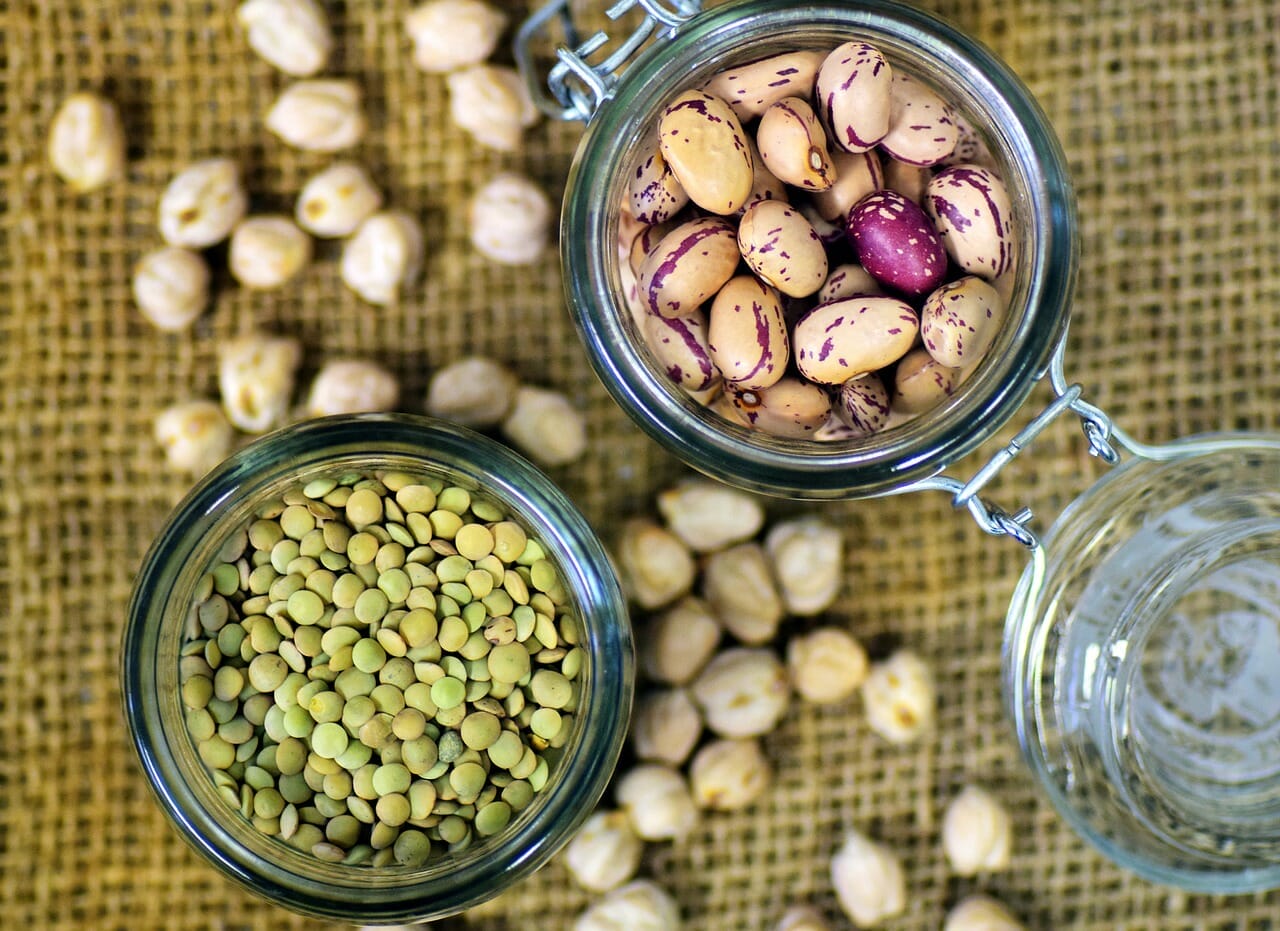
Legumes — including chickpeas, black-eyed peas, peas, kidney bean seeds and peanuts — contain antinutrients such as tannins, phytic acid and trypsin inhibitors.
Note: You can degrade some (but not all) antinutrients by boiling, sprouting or soaking grains and legumes before consuming them.
They may also contain lectins. For example, raw red kidney beans contain up to 70,000 lectin units (versus up to 400 lectin units in fully-cooked beans).
For a long time, I thought that our Paleolithic ancestors didn’t consume legumes because they didn’t know how to process them. I was wrong. Scientists have found neanderthals with starches between their teeth that resembled carbohydrates from cooked legumes.
If you think about it, that makes sense: how could they have started cultivating legumes and grains without having discovered them beforehand?
However, while early humans might have been exposed to grains and legumes, those items weren’t a staple of their diets (like they are for us today). Plus, our genetically-modified and lab-altered versions of these foods have (genetically) little in common with the ones humans might have eaten over 10,000 years ago.
More importantly, legumes have low nutritional value compared to healthier alternatives. And since I have no desire to spend a lot of time correctly processing them (see below), I see no reason to make them part of my diet. In business terms, I’d say that grains and legumes have a weak value proposition.
Grains
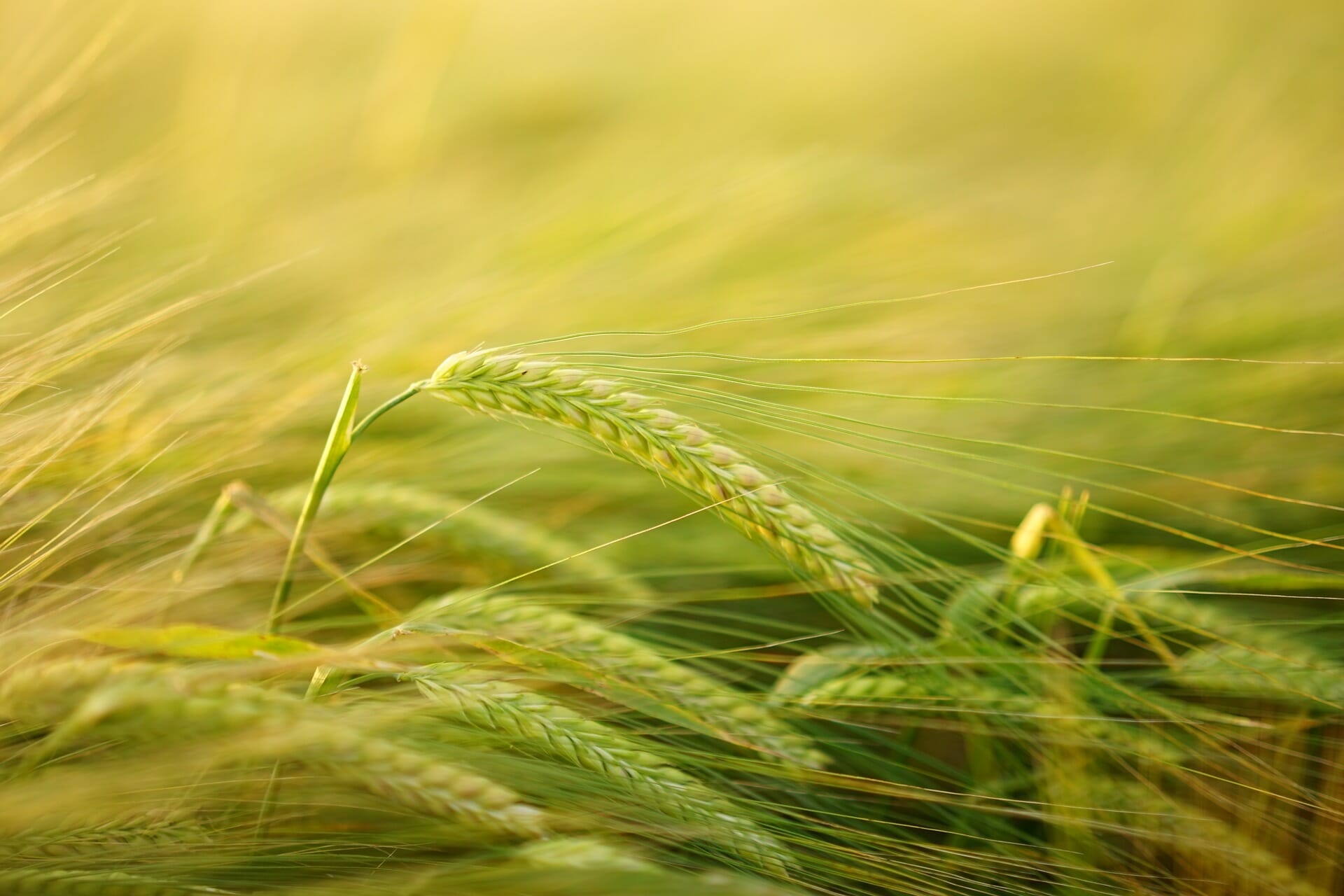
The hulls of whole grains contain the antinutrients phytate and saponins. Also, certain grains — including wheat, barley and rye — contain the antinutrient gluten.
From a nutritional perspective, most grains are even worse than legumes, coming in at the bottom of the list in terms of nutrient density. You don’t need them, and while certain processing methods (e.g., fermentation) can reduce some of the antinutrients (such as gluten), you can’t eliminate them.
Unless you’re metabolically healthy and have zero gut issues, I recommend cutting grains out of your diet entirely because of their low nutritional value and high antinutrient content. If you’re in top shape (from a metabolic and gastrointestinal perspective), consuming the occasional sourdough bread will likely not harm you.
The only exception to my no-grains rule is white rice, because it’s been stripped of all the parts of the seed that contain the highest concentrations of antinutrients, including the hull. The main issue with white rice is that it’s devoid of micronutrients. In other words, it’s just a load of carbs. But if that’s what you’re going for, white rice is arguably the healthiest grain in the mix.
For a while I strategically leveraged white rice to help replenish my glycogen stores before bedtime. I work out most days but don’t consume any carbs until later afternoon. Even then, my daily carb intake is usually below 150 grams. Often, that results in my body running out of glycogen overnight, thus causing me to wake up and pee. Consuming white rice for dinner provides my body with slower-burning carbs than I would get from sweet fruits, thus allowing me to sleep through the night.
Unfortunately, I noticed that I was getting heart burn after consuming rice and so I stopped doing that. That’s why I always recommend carefully listening to your body. It’ll usually tell you whether or not you can handle certain foods.
To learn more about why you should ban most grains from your diet, check out this list of reasons grains make you sick.
Nuts and Seeds

Most nuts (in particular, the hulls of their seeds) contain phytate. That kind of throws a wrench into the hypothesis that nuts are healthy, and seeds (such as chia seeds) are superfoods, doesn’t it?
To learn more, check out my article about the best nuts and seeds for a low-carb lifestyle.
The Least Toxic Plants
If you’ve come this far, you’re probably wondering what plants there are left to eat, considering all of the toxins listed above.
It’s true that the list of plants that are safe to eat due to their relatively low toxicity and potential to cause inflammation is short.
Here are some of the least-toxic plants, which I consume on a regular basis:
- Avocados: These are actually fruit, but they’re very low in carbs and high in healthy fats.
- Berries: These are my favorite fruits. We grow several types of them in our garden, including raspberries, blackberries, strawberries and blueberries. Note that out of all the berries, raspberries have the highest amount of oxalates (about 48 mg per serving). While that sounds like a lot, it’s nothing compared to what you find in spinach and other leafy greens.
- Cucumbers (peeled and deseeded): I’m not crazy for cucumbers, but if you remove the most toxic parts (the skin and seeds) and season them with salt, they actually make for a pretty refreshing snack on hot summer days due to their high water content.
- Dates: While dates contain a boatload of sugar, they’re relatively low in defense chemicals. We occasionally use them as a natural sweetener, but you can certainly consume them whole.
- Olives: Much like avocados, olives are fruit and I regularly enjoy them with dinner.
- Squash (peeled and deseeded): Similar to cucumbers, squash (including pumpkins and zucchinis) has most of its defense chemicals concentrated in the skin and seeds.
- Sweet fruits (apples, bananas, mangos, oranges, pears, etc.): These fruits want to be eaten so you can spread their seeds.
What’s important to understand is that although the plants in the list above are among the least-toxic available, that fact doesn’t mean that you should consume them at the exclusion of meat.
In other words, don’t eat a big fruit salad instead of a steak or liver.
Plants used to be a survival food that early humans and our ancestors ate when they didn’t have access to more nutritious sources of food (animals). Considering that most of us have constant access to food from animal sources, I treat veggies and fruits as a side dish or a snack but not as a replacement for meat or organ meat.
How to Make Plants More Nutritious
While paying attention to what you eat is important for optimal health, many people underestimate the importance of how they eat.
Food preparation plays a critical role in ensuring that what you eat doesn’t negatively impact your health.
Here’s a list of food preparation methods that humans have used for thousands of years to make plant food more nutritious and to reduce its toxicity.
- Sprouting leads to the segregation of certain antinutrients, such as phytate and protease inhibitors.
- Milling removes the bran layer from grains (which contains most of the plant’s antinutrients).
- Soaking removes some of the enzyme inhibitors (such as phytic acid) and other antinutrients found in grains. Soaking also reduces cooking times.
- Fermenting degrades many of the phytates in grains, improves the absorption of minerals, and reduces the glycemic index of many other foods (e.g., sweet potatoes).
- Heating destroys or degrades many heat-sensitive antinutrients, including phytic content.
- Peeling and deseeding removes many plant toxins that are concentrated in the vital parts of the plant.
To learn more about plant food anti-nutritional factors and their reduction strategies, check out this scientific paper published in 2020 in BioMed Central. I also encourage you to read the book Eat Like a Human by Dr. Bill Schindler.
Here at the Kummer household, we occasionally bake sourdough bread using a double-fermentation process. We also ferment peeled sweet potato fries in a 2.5% saltwater solution for several days before frying them in animal fat, and we consume peeled and deseeded cucumbers and squash. Occasionally, we also make tomato sauce for the kids using deseeded tomatoes we grow in our garden.
However, I should point out that none of the methods mentioned above completely remove all plant toxins. Instead, they bring the toxic load of plants down to levels a metabolically healthy person can deal with.
In other words, if you currently suffer from a metabolic disease, I recommend avoiding most, if not all, plant foods until you’re healthy and your body is able to process plant toxins properly.
Why Vegan Diets Aren’t Healthy (Despite What You Might Have Heard)
Plant-based eating is trendy right now because it’s associated with better health and well-being. Plus, there’s plenty of scientific research that suggests vegan or vegetarian diets are better for your health.
The problem is that the world of scientific research is complex and often misleading. Additionally, most larger studies are funded by either a government or private industry (i.e., the agricultural industry) who have an agenda, thus influencing the final outcome.
That doesn’t mean you should never trust studies that are backed by these entities — it means you need to approach this research with a healthy dose of skepticism and interpret its findings based on a solid understanding of how each study was conducted.
There are three major types of scientific research, and the quality of their results differs vastly. These types include:
- Epidemiological or observational studies.
- Intervention studies or clinical trials.
- Systematic reviews or meta-analyses (of available studies).
An epidemiological study is, as the name implies, a study that involves observing a group of people and then correlating their behavior to certain health outcomes.
For example, a study published in the Journal of the American Heart Association said that African Americans who watched more than four hours of television every day faced a 50% greater risk of heart disease and premature death compared to those who watched less than two hours of TV per day.
But the headlines you saw in the press read: “Binge Watching TV May Raise Your Risk of Heart Disease.”
Obviously, neither the television itself nor watching it causes cardiovascular disease. But there’s a good chance that people who watch TV for more than four hours a day don’t follow a healthy diet, exercise regularly or sleep well.
In other words, there are “confounding factors” that many studies don’t account for (and which don’t get reported in most news stories). Most importantly you need to understand that correlation isn’t the same as causation, and only the latter should be seen as scientific proof.
Additionally, many nutritional studies that suggest a plant-based diet is healthier than a “regular” diet don’t take healthy user bias into account.
What that means is that most people who follow a vegan (or plant-based) diet are more conscious about their health and do other things to support it, including exercising regularly, avoiding junk food, practicing yoga and meditation, and so on.
So it shouldn’t come as a surprise that someone who does all of these things is generally healthier than the average Joe who eats a standard American diet high in processed foods and added sugars, and who doesn’t exercise regularly or exhibit any other healthy lifestyle choices.
The issue is that most nutritional studies fall into the above category and are thus only good to establish a hypothesis that has to be proven or disproven by an interventional study or clinical trial.
Speaking of interventional studies, I have found none that suggest eating plants is healthier than eating animals nose-to-tail. However, there is solid scientific evidence that “meat-eating extends human life expectancy worldwide (even after accounting for socioeconomic factors.”
“Meat of small and large animals provided optimal nutrition to our ancestors who developed genetic, physiological, and morphological adaptations to eating meat products and we have inherited those adaptations.”
— Maciej Henneberg, Professor Emeritus, University of Adelaide
Additionally, in 2020 a team of researchers at Harvard University conducted the first mainstream study on the carnivore diet. The study surveyed more 2000 carnivore adherents, and the findings were published in Current Developments in Nutrition. While I encourage you to read the entire study, it’s worth sharing some of the study’s findings related to changes in chronic health conditions:
- 98% improved or resolved diabetes and insulin resistance.
- 97% improved or resolved gastrointestinal conditions.
- 96% improved or resolved musculoskeletal issues.
- 96% improved or resolved psychiatric symptoms.
- 93% improved or resolved overweight/obesity (mean BMI decreased from 27.2 to 24.3).
- 93% improved or resolved hypertension.
- 92% improved or resolved urologic issues.
- 92% improved or resolved dermatologic issues.
- 89% improved or resolved autoimmune conditions.
- 84% improved or resolved cardiovascular issues.
Aside from modern science, there is one study that involved a lot of people over a very long period of time. That study, of course, is evolution. And based on everything we know about how humans evolved, we were apex predators who consumed predominantly animals and we are who we are today because of that fact.
Coincidentally, evolution also played out the plants vs. meat argument. Around 2.5 million years ago, the hominin Australopithecus gave rise to both the Homo lineage and the Paranthropus genus. The former evolved into meat-eaters (and ultimately us) while the latter evolved into plant-eaters and went extinct about a million years ago.
So no, plant-based diets aren’t healthier and don’t reduce risk factors for chronic diseases when compared to a nose-to-tail animal-based diet. However, when compared to a standard American diet, plant-based diets might be less bad. But that doesn’t make them good for you.
The Blue Zone Myth
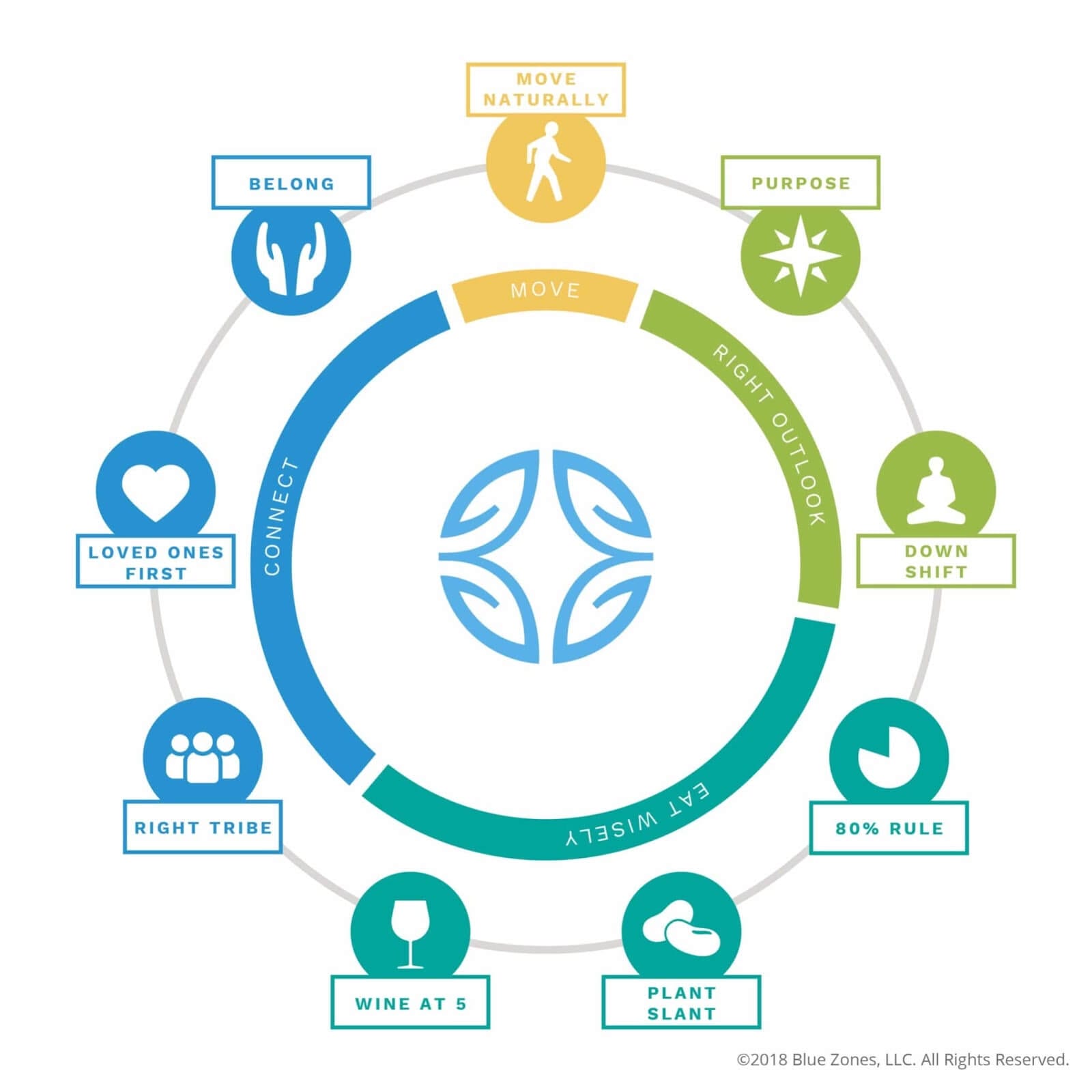
You’ve probably heard about the so-called “Blue Zones,” which are geographic regions where a higher than usual number of people live much longer than average while consuming a predominantly plant-based diet.
The regions of the world that are considered Blue Zones include Loma Linda (California), Nicoya Peninsula (Costa Rica), Sardinia (Italy), Icaria (Greece) and Okinawa (Japan).
The assumption is that certain lifestyle factors allow people in these regions to live much longer than their peers.
Dan Buettner and the researchers who developed the concept of Blue Zones observed that the following behaviors are correlated with the above-average longevity in these regions:
- Cultivate a sense of belonging: Create a healthy social network, connect/reconnect with religion, prioritize family.
- Eat wisely: Eat until 80% full; eat more veggies, less meat and processed food; drink a glass of wine every day.
- Have the right outlook: Know your purpose and downshift (work less, slow down, take vacations).
- Move naturally: Make daily physical activity an unavoidable part of your environment.
While I don’t argue that we can benefit from borrowing some of the habits from the people in these regions, I seriously doubt that eating more veggies and less meat has anything to do with living longer and healthier lives.
First of all, we’re (again) dealing with epidemiology or observational science that can prove correlation but not causation.
But the second, and potentially bigger, problem is that Buettner cherry picked a few regions while ignoring others, such as Hong Kong, Japan and Iceland, where people do consume a significant amount of animal products (such as meat and eggs) and also enjoy above-average lifespans.
People in Hong Kong have an average life expectancy of 85 years and they consume an average of 1.5 pounds of beef per day, compared to 0.16 pounds in the United States.
That’s the same disastrous error that Ancel Key made with his seven country study that led to the long-running myth that saturated fat causes heart disease and the subsequent removal of saturated fats and cholesterol from our diet.
There are also several inconsistencies within these Blue Zones that don’t make sense if food were to be the reason for living longer.
For example, in the Nicoya region of Costa Rica, men live 25 years longer than their peers in other regions. However, women only live nine years longer on average. If food was the primary factor, I would expect similar results among both sexes.
Plus, according to Dr. Paul Saladino (the leading authority on the science and application of the carnivore diet), Costa Ricans from the Nicoya region cook more of their food using animal fats than their peers, who use more vegetable or seed oils.
I should also mention that my wife is Costa Rican, spent most of her early life there, and all of her family still lives there. What I can tell you from everything I’ve seen and experienced first-hand is that obesity and chronic disease are rampant in this country (much like in the U.S.), so it doesn’t surprise me that certain regions enjoy a higher life expectancy than others — especially those regions that haven’t adopted a Western way of living that includes highly-processed foods, industrial seed oils and sedentary behavior.
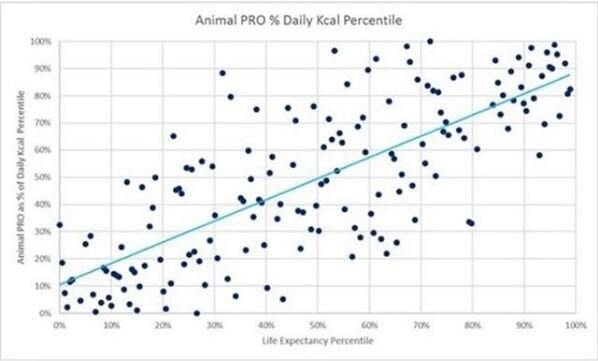
Plus, if you compare the life expectancy in over 105 countries to the percentage of calories obtained from animal foods, you’ll see a very different picture than what Buettner painted (as shown in the spray chart above).
Now let’s move away from Costa Rica and take a look at Sardinia, which is listed as a Blue Zone in Italy and which is often mentioned in scientific research.
Guess what one of the traditional dishes of Sardinian cuisine is? Porceddu or Sarda Pig!
The rugged Mediterranean island has a cuisine all its own, with cheesy pastries, fresh lobster, and spit-roasted meats.
— Eater.com
But we don’t have to look to other countries to see such inconsistencies. What about Loma Linda in California? It turns out that Loma Linda is the home of the Seventh-Day Adventists, a Christian religious group whose members don’t eat meat and live, on average, seven years longer than other people in California.
But guess what?
Californian Mormons, who do eat meat, also live an average of seven years longer.
What these two groups have in common is that most of their members don’t drink or smoke, and are part of a tight-knit community.
So, evidently, it’s not the meat but something else.
Last but not least, studies have proven that many of the old people living in these Blue Zones aren’t as old as we thought, thanks to a combination of errors in record keeping and fraud. For example, a recent study by researchers at the University of Oxford concluded that that, “Supercentenarians and the oldest-old are concentrated into regions with no birth certificates and short lifespans.”
In another study, titled “Nutrition for the Japanese Elderly,” the authors did not find any vegetarians among the centenarians.
The bottom line is that Blue Zones aren’t what you might have been led to think, and I encourage you to check out Dr. Saladino’s book The Carnivore Code and this podcast for more information on the topic.
Last but not least, remember the study I mentioned above, which clearly demonstrated that “meat-eating extends human life expectancy worldwide (even after accounting for socioeconomic factors.” Case closed.
How I Transitioned From a Standard American Diet to an Animal-Based Diet



I grew up on a Mediterranean diet before transitioning to a standard American diet when I moved to the U.S. in 2007. So in a way, I went from “not great” to “really bad.”
It wasn’t until after our daughter was born in 2013 that my wife and I started making changes to our dietary lifestyle, beginning with the removal of all products that contained added sugar. In 2015, the entire Kummer family shifted to a modern paleo diet before I started on a ketogenic paleo diet in 2018.
After I read the books Carnivore Code and The Plant Paradox in 2020, I finally realized that many of the low-carb plants I was consuming weren’t good for me and I adapted my lifestyle again to remove the most toxic items.
On the flip side, I started eating more carbs (from honey and sweet fruits), which made me feel even better than I did already.
As you can see, it took me a couple of years to make this transition and I’ll continue fine-tuning my diet based on the latest scientific evidence. And, most importantly, based on how I feel.
If you’re still at the starting point of your dietary journey, there’s no need to spend several years transitioning to a species-appropriate diet. Instead, use my knowledge and the mistakes I’ve made as a shortcut and jump right to the front of the line.
If nothing else, try it out for 30 days, see how amazing you feel, and never worry again about eating that broccoli (nobody truly likes how it tastes anyway).
If you’re a parent, following an animal-based diet together with your children gives you special superpowers because you’ll be among the few that won’t have to force their kids to eat their veggies!
Learn more: Watch my YouTube video about how I stay healthy, fit and strong.
Frequently Asked Questions
No, it’s not. It’s how life works, and how it has always worked. Besides, growing plants kills animals on a large scale, too. Just try growing tomatoes in your backyard and you’ll realize how many caterpillars and other insects you’ll have to kill to protect your plants and crops.
I remove caterpillars from our tomato plants on a regular basis and feed them to our chickens, thus being instrumental to their demise. That’s how it works.
Now extrapolate this example to large-scale farming and the growing of monocrops, such as soy, corn and wheat. Not only do pesticides (organic or otherwise) kill millions of animals, they also deplete the soil, requiring more fertilizer that further messes with the natural ecosystem.
Growing plants at scale is not good for anyone, including humans, animals and our planet.
Despite what Big Food lobbyists will tell you, raising and eating animals does not have to harm the planet nor is it bad for your health.
In fact, farms that raise cattle in a species-appropriate manner sequester more carbon dioxide than they produce. White Oak Pastures is an excellent example of a carbon-negative operation that produces some of the finest meats in this country.
No, it doesn’t! How can a food that humans have consumed for millions of years suddenly be bad for us by increasing the risk factors for developing cardiovascular disease, high blood pressure or cancer? That doesn’t make any sense.
The reason why you might have seen some “evidence” suggesting that meat-eaters have a higher risk of developing heart disease or cancer is due to poorly designed or misinterpreted studies (as I explained above).
The same principle applies to the correlation of eating red meat and developing high blood pressure. While there might be a correlation based on confounding factors, eating meat doesn’t cause high blood pressure.
And if your doctor tells you that consuming saturated fats and cholesterol from animal sources negatively impacts your blood lipid levels, I recommend looking for another doctor because a recent landmark systematic review and meta-analysis showed that the conceptual model of dietary saturated fat clogging a pipe is just plain wrong.
In other words, saturated fats aren’t detrimental to your health (or cholesterol levels). You can learn more about saturated fats and their importance to your health in this article.
I strongly believe that achieving and maintaining an appropriate weight is the byproduct of a healthy lifestyle that’s centered around regular exercise, quality sleep and an animal-based diet. In fact — contrary to conventional wisdom — eating meat can help you lose weight.
Anecdotally, 95% of the food I eat comes from animal-based sources and 70% of the calories I consume are from fat (mostly saturated fat). I eat as much as I want and have no issues whatsoever maintaining my weight. Evidently, I don’t need to eat plants to maintain my weight — and neither do you.
In fact, several studies have shown that following ketogenic diets that are high in fat and low in carbs (animal-based diets are by definition low in carbs and high in fat) helps with weight loss.
If you’re looking for ways to reach or maintain your desired weight, check out my articles on the best diets for weight loss and the common reasons why people struggle to lose weight.
I firmly believe that you can follow any diet for a while and perform well — and even look healthy on the outside — as long as you compensate with other lifestyle choices, such as exercise and supplements.
When I was a professional athlete in my early 20s, I had an awful diet consisting predominantly of processed carbs. For example, there were a couple of times that I ate 10 cheeseburgers, paired with half a gallon of sugar-laden iced tea and a bucket of popcorn while watching a movie in the theater.
Despite that, I was one of the top five 100-meter sprinters in Europe in my age group.
The problem is that such a lifestyle has an expiration date. Plus, it likely prevented me from reaching my full potential.
Fast-forward almost 20 years and I’m fitter, stronger and have more endurance than I had when I was young.
Of course, that shouldn’t be possible. Yet it is, because these days I’m feeding my body the fuel it needs to reach its potential.
So if you see Venus Williams, Kyrie Irving or Alex Morgan smiling into the camera while holding a carrot stick, know they’re performing well despite their dietary habits, not because of them.
Not necessarily. The modern paleo diet allows for the consumption of many plants that we now know are toxic, including broccoli, Brussels sprouts, tomatoes and peppers.
While it won’t kill you to consume these vegetables from time to time, I would not make them part of your regular diet.
Also, keep in mind that everyone reacts to foods slightly differently. So you’ll have to test out what plants you can get away with.
If you can’t stomach the thought of consuming the odd bits of an animal, I don’t blame you. That’s one of the reasons why I decided to create a freeze-dried beef liver supplement. It’s absolutely tasteless but each serving contains the same micronutrients as one ounce of fresh liver.
I’d also encourage you to check out my article about the health benefits of consuming organ meats. Some organs, including heart and lungs, taste really good and similar to regular muscle meat!
That depends very much on your state of health. If your metabolism is functioning optimally — perhaps because you’ve been following a carnivore or animal-based diet for a while — you can likely handle higher loads of certain toxins (such as oxalates) than someone who isn’t metabolically healthy, has a leaky gut, or who has other issues.
All you can do is listen to your body and try to figure out what you can get away with.
According to a new study, vegan kids are on average 1.24 inches (3.15 cm) shorter than their omnivorous peers, and have a lower bone density.
Additionally, the vegan kids that participated in the study had lower HDL, higher triglycerides, vitamin B-12 deficiencies, low ferritin (iron) and iron-deficiency anemia.
So vegan kids are clearly less healthy, even when compared to kids who follow a traditional Western diet.
Despite these findings, the study concluded that vegan diets were associated with a healthier cardiovascular risk profile because of lower LDL and total cholesterol markers, neither of which says anything about cardiovascular health (as I explained in this article).
No, you don’t. There is a misconception that we need to consume plants that are rich in antioxidants (e.g., grapes, berries, nuts, artichokes, kale, etc.) to combat free radicals, mitigate oxidative stress and lower the risk of developing certain diseases.
The truth is that there are no clinical trials to support the notion that consuming more antioxidants (and including them in supplement form) reduces the chance of developing a disease, despite what epidemiological studies have suggested.
Why is that?
It’s pretty simple. Plants and mammals have an entirely different “operating system” and just because antioxidants work in plants doesn’t mean they work the same way (or at all) in mammals.
No, products that try to mimic animal foods are usually loaded with highly processed and inflammatory ingredients such as industrial seed oils that are detrimental to your health. So I’d stay away from products like Beyond Meat, Impossible Burger or anything made with soy.
I’d argue that anything that gets you close to consuming animal products is better than a strict plant-based diet.
As you might know, there are several shades of plant-based eating, including vegan, vegetarian, ovo vegetarian, lacto-ovo vegetarian, lacto vegetarian, pescatarian, flexitarian and possibly others.
Just keep in mind that while vegetarianism might be better than veganism, neither one is great for your health.
There are pros and cons to consuming (pasteurized) dairy, which I covered in my article “Is Dairy Bad For You.” In a nutshell, some dairy products contain milk sugar (lactose) that most adults are sensitive to because they lack the required enzyme (lactase) to digest lactose. That’s why I recommend sticking with fermented (kefir) or aged dairy products (cheeses) that contain only residual amounts of lactose.
At the same time, most dairy products made from cows’ milk contain an inflammatory type of protein (casein beta A1) that many people are sensitive to. That’s why I recommend consuming only dairy products from animals that produce A2 milk, including Jersey cows, goats, sheep or camels.
The main issue with pasteurized dairy products is that the pasteurization kills all good bacteria and denatures many of its proteins, making it pro-inflammatory. That’s because the immune system doesn’t recognize the damaged proteins and treats them as intruders instead. That’s why I recommend sticking to raw dairy from local farms you trust.
Unlike if you follow a vegan diet, you shouldn’t need any supplements if you follow a nose-to-tail animal-based diet. That’s because you’ll get all of the macronutrients and micronutrients from muscle and organ meats.
That means that even if you’re a competitive athlete or a serious fitness enthusiast, you probably get enough protein from the meat you eat.
Case in point: I don’t use protein powders because I get more than enough protein from red meat.
However, if you absolutely don’t like the taste of organ meats or don’t have easy access to them, there is nothing wrong with using freeze-dried organ meats, such as the Grass-Fed Beef Liver capsules we sell at MK Supplements.
One of the goals of plant-based diet advocates is to reduce overall global meat consumption — either by steering people towards plant-based options (thus reducing the demand for meat) and/or by taxing and regulating meat production to the point that it’s no longer economically viable.
My wife and I started a homestead last year with the goal to learn as much as we can about raising livestock, and to produce some of the food we consume ourselves. We currently have honeybees, chickens and a garden to grow a few of the plants we eat. We’ll be adding goats or pigs next, but I do see cattle in the future (which we’d then butcher for meat).
Despite what you may have been told, there is no credible anthropological or scientific evidence that humans need to consume fiber for optimal gut or cardiovascular health. I invite you to read my in-depth article covering the fiber myth in the context of a carnivore diet. It explains in plain language (backed up with scientific evidence) why humans don’t need fiber to enjoy optimal health.
Where to Find More Information
If this article piqued your interest in changing your lifestyle and you’d like to learn more, here are a handful of articles and YouTube videos that you can check out:
- How We Got Our Kids to Eat Healthy
- What I Do to Stay Healthy, Fit and Strong
- Why Kids Should be on a Ketogenic Diet
- How Xenoestrogens Make You Infertile and Sick
- How to Live a Healthy Lifestyle
- Paleolithic Ketogenic Diet – Ultimate Beginner’s Guide
- Food Lies – A six-part documentary about the nutritional BS we’ve been fed for the past few decades. You can support the making of this movie on Indiegogo.
If you have any questions about this article that the resources above can’t answer, please don’t hesitate to leave a comment below or shoot me an email!
Why You Should Remove (Most) Plants from Your Diet
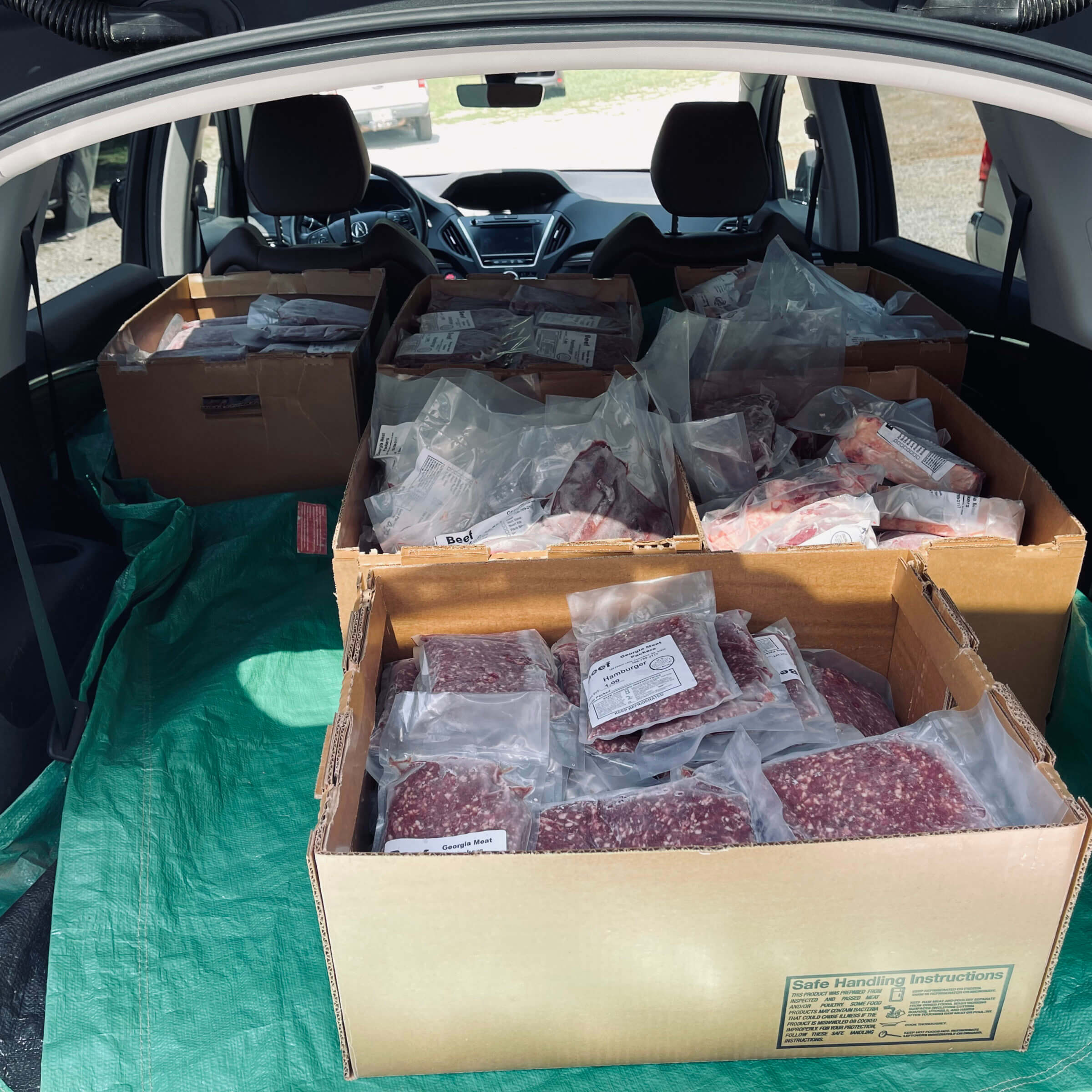
I know the title of this post sounds more radical than it actually is. But we live in a time where the food industry and certain government agencies have gone haywire by promoting meatless products that look like real food but aren’t.
There has even been discussions of taxing meat for the sake of reducing carbon emissions. And Bill Gates wants to grow meat in labs. And I sit here thinking, WTF is wrong with you people?
How did we get so disconnected from reality and the knowledge of what is a species-appropriate diet based on millions of years of evolution?
Why are our elected officials and the general population not connecting the dots between the ever-increasing rates of obesity and chronic disease and the foods we have been eating for the past few decades?
It’s mind-boggling. And that’s why I decided to make a clear statement with this blog post: plants are not healthy and they’re not where humans should get the majority of their nutrients and calories. Humans should predominantly consume animals.
That doesn’t mean you should never eat plants again. I consume plenty of seasonal fruits, avocados, olives and a few cucumbers here and there. Heck, I even eat some toxic plants from time to time. For example, we grow tomatoes to make our own ketchup. However, we remove the skin and seeds of the tomatoes to reduce their toxic load!
The good news is the human body is incredibly resilient. If it wasn’t, we would all be dead already. While that doesn’t mean you should continue loading up on plant-based toxins every day (if you do, you’ll pay the price at some point), it’s never too late to change your diet.
I followed a traditional Western diet for over 30 years before I adopted a paleo diet a few years ago. These days, my dietary framework combined elements of paleo, keto and carnivore diets, and I’m the healthiest, fittest and strongest I’ve ever been.
So regardless of how old you are, it’s not too late to ditch the plants and start eating the foods the human body has evolved to thrive on: pasture-raised and wild-caught animals, pasture raised eggs, and a limited amount of raw honey, seasonal fruits and the least-toxic veggies.
So give it a try and let me know how it goes!

Michael Kummer is a healthy living enthusiast and CrossFit athlete whose goal is to help people achieve optimal health by bridging the gap between ancestral living and the demands of modern society.

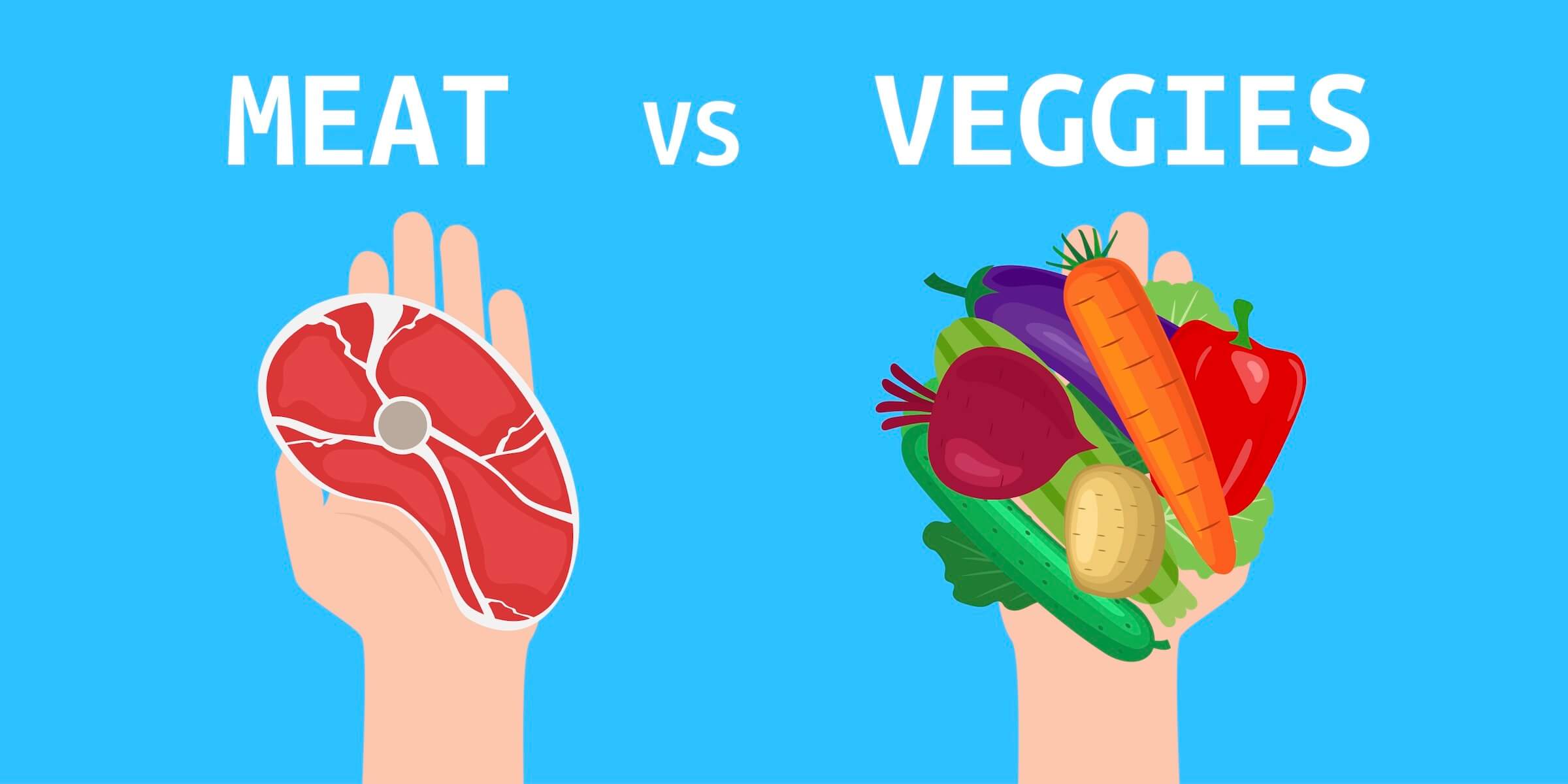
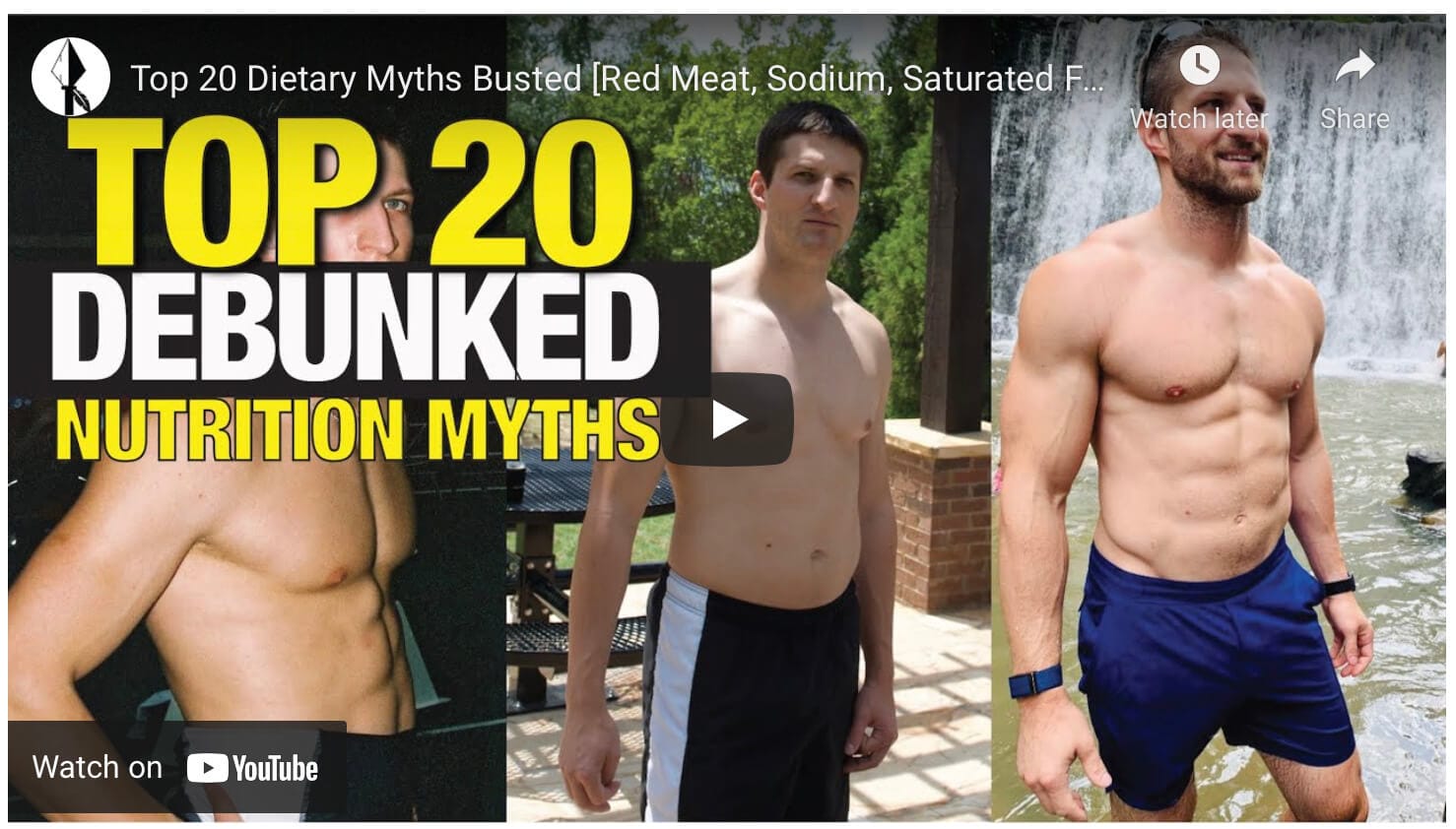

It seems you are determined to “de-bunk” a vegan diet, and if that is the case, I don’t understand why. Why not just focus on the benefits of your diet instead of trying to undermine another one that seems to work for many other people (myself included)?
There isn’t really anything do debunk. Humans haven’t been plant eaters in 2.6 million years and it’s my obligation to share that knowledge with anyone who didn’t know that. But I’m glad to hear eating only plants works for you. You must have evolved.
Please do not put people down….just because they have different eating preference. Thank you C.
What do you think about drinking tea?
I think that’s fine.
Hi Michael,
Michael here also, LOA! Which means Law Of Attraction! Read your article, interesting! I’m from Dallas, Texas have ate meat all my life! Now though this I must tell you, that my wife and I are heading to a Blue Zone( Ikaria Island, Greece) because she has Stage IV Ovarian Cancer! Has done 45 treatments of Chemo, which is Killing her, NO MORE! We found this Island, for her to LIVE. SO, I must do this for her to LIVE! Please check out Gray Salt, Thermal Hot Springs, their Honey, homegrown plants, their Wines( no preservatives or additives on ANY of their FOOD! Please email me: [email protected] P.S. any suggestions are appreciated from anyone that reads this, or emails. Thank y’all. Michael OO.👍😇🙏
Read this at the end of his blog:
Medical Disclaimer
The information shared on this blog is for educational purposes only, is not a substitute for the advice of medical doctors or registered dieticians (which we are not) and should not be used to prevent, diagnose, or treat any condition. Consult with a physician before starting a fitness regimen, adding supplements to your diet, or making other changes that may affect your medications, treatment plan or overall health. MichaelKummer.com and its owner MK Media Group, LLC are not liable for how you use and implement the information shared here, which is based on the opinions of the authors formed after engaging in personal use and research. We recommend products, services, or programs and are sometimes compensated for doing so as affiliates. Please read our Terms and Conditions for further information, including our privacy policy.
Unfortunately, we live in a country where litigation is easier than taking self-responsibility. As a result, we have to use such disclaimers.
Hy Michael,
three years ago, I had big problems with digestion (diarrhea). So I was trying different diets and needed around 1+ years to find that or me is low fodmap diet.
I do agree with you about meat vs veggies but…I am a cyclist and in cycling sugar is the king not ketone.
For me I found out it works if I eat:
Protein and fat: lots of meat (mostly beef), organs, all meat actually and some fish but not much. Olive oil
From sugars I eat mostly potato, gluten free bread, berries, figs, dates.
Plants: paprika, cucumber, micro plants.
“Animals fight or run when you try to kill them.” Humans also fight or run when you try to kill them, that’s terrible. I cannot imagine looking into a chicken’s eyes before I slit it’s throat! It’s disconnecting I think.
I don’t understand your human vs. animal argument and how that relates to plant toxins. Taking the life of an animal doesn’t have to feel good (and it shouldn’t) but being incapable of doing it for the sake of your own survival is a sign of being disconnected from how nature works.
What Pea maybe attempting to illustrate, is your article states that plants have a natural defensive mechanism that “it does not want to be eaten”. The same goes for animals that we eat – they too do not want to be eaten, so that that mean we should not eat meat too? My uncle is a vegan most his entire life and he is 76 years old. He is in more shape and engages in more recreational activities then most 25 year old’s I know. I say, eat whatever the hell you want and just try to stick to foods with low glycemic foods to avoid overeating and spiking your sugar levels. Enjoy life where it takes you :-)
Animals fight or run…we’re just superior and can usually kill them anyway. Eating them after the fact won’t harm us (meat doesn’t have defense chemicals). Eating plants does. Veganism is a modern luxury, thanks to supplements and flying food in from all over the world so we get enough nutrients into our bodies to survive. Try surviving in the wild for 3 months on a vegan diet and you’ll realize that humans aren’t meant to eating plants.
PS: I’m sure your uncle looks favorable compared to the average 25-year-old who follows a standard American diet, has poor sleep, too much stress, doesn’t exercise etc. Compare your uncle to someone like Dr. Shawn Baker or other meat eaters and I suspect your uncle won’t be looking that good. But hey…whatever works for you (and your uncle).
Vegetables are the healthiest foods. Don’t eat refined sugar or incessant carbs (like bread etc) Then you will live a long life.
Have you actually read the article or just decided to post a comment after reading the headline?
Yes and no. It’s very long. I didn’t give it a careful word for word reading. I think we disagree on facts.
So it sounds like your opinions don’t agree with factual information. Maybe it’s time to read the entire article, follow the links to the scientific evidence and revaluate your opinions.
Stop being mean to Vincent. In order to properly have a different opinion, one must understand the other opinion. It makes you willfully ignorant. Both carnivores and vegans or vegetarians, whatever you want to call it, have testimonials of wellness and they both make valid points. Good Lord, geez
You’re very respectful!
you aren’t entitled to your own facts, Vincent. Glad I could help.
Hi Michael,
My name is Mitchell Saron and I am a senior at Harvard University. For my Human Diet class, I am to write a 10-page paper on a topic of my choosing. I have been trying to incorporate an animal-based diet for the past couple months and have been fascinated by the research surrounding this topic as I am an athlete at school.
While I was excited to take this course this year, it has been full of misinformation about the human diet. Specifically, we had a whole unit ‘debunking’ the carnivore diet. Consequently, I would love to write my final paper on the benefits of the carnivore or animal-based diet and the importance of eliminating grains, seed oils, and vegetables from our diets. I would really appreciate it if I could get some of your most convincing clinical studies for my paper as I need about 10-15 sources for my essay.
This article has been a lot of help, but I would love some studies about the benefits of your diet and the problems with seed oils so I could show the hypocrisy of this class to my professor. Please let me know if I could just get some links to these studies. I would really appreciate it!
Looking forward to hearing from you!
Best,
—
Mitchell Saron
Hey Mitchell,
I recommend checking out the articles tagged with Nutrition (https://michaelkummer.com/tag/nutrition/) and specifically the following ones:
– https://michaelkummer.com/saturated-fat-risks/
– https://michaelkummer.com/red-meat-cancer/
– https://michaelkummer.com/top-nutrition-myths/
– https://michaelkummer.com/diet-inflammation/
Those articles have additional links to scientific research.
Cheers,
Michael
Thank you Michael this page has been a great read and will serve as strong material for my critical writing during my nutrition degree and going against all the textbooks that are pro plant and really outdated in terms of LDL, insulin resistance etc etc. The eatwell guide here in the UK needs updating asap and I hope to make some small steps with my 2nd shot at higher education to change the viewpoint on what we should really be eating which fits in perfectly with regenerative agriculture, it all makes so much sense to change the system. I already had the carnivore code and have been compiling studies to cite in my work but this brings more of it together neatly. Best wishes to you and family in your lives and your work regards Barnabas
Thanks so much for the feedback, Barnabas and good luck with your studies!
Interesting thoughts. I suggest however that you read a few of Ray Peat’s articles. He is a PhD biochemist with some radical ideas that largely agree with some of the things you state (grains are bad, leafy portions and seeds of plants are toxic, saturated fat is good, polyunsaturated bad), but some that turn “paleo” ideas upside down (sugar is good (incidentally, human brains got bigger when we started eating sugar-laden fruits, not meats). Also, an avocado contains 4g polyunsaturated fat… hardly belongs in your “healthy” list – furthermore, Ray has written that they are in fact one of the worst things you can eat and actually teratogenic. Now, I am in disagreement with both you AND Ray on the idea of grains being so bad for us. All great human civilizations have subsisted on grain-based staple foods for millennia. Evolution is a slow process, sure, but one would think that through many generations, our genetic makeup should by now render us largely immune to the negative effects of grains. Most gluten intolerance I imagine should be found outside those of European descent, as bread has been on that continent for ages. Food for thought.
Hey Scott,
I’m not opposed to eating sweet fruits (they’re one of the few types of plants I consume on a regular basis) even though some would argue that eating meat and organs caused our brains to grow and not fruits (which weren’t available on many parts of the world).
Avocados consists most of 15 grams monounsaturated, 4 grams polyunsaturated, 3 grams saturated. The 4 grams of PUFAs aren’t an issue imho.
If prepared properly, some of the foods I mentioned in the article (including grains) can be OK to consume if prepared properly AND you’re metabolically health. I referring to soaking, sprouting, fermenting…all the things humans have learned over the past thousands of years to make the nutrients in those foods more accessible. I have it on my todo list to add that to the article. However, I firmly believe that humans don’t need any of those foods to thrive. There is nothing in them we can’t get from animals.
I wonder how many fruits you recommend to eat daily. For example, if I eat 2 × 300 gram steaks each day, how many fruits should I eat to complement that?
As much as you like as long as the meat makes up the majority of your calories. I’d shoot for about 1 gram of protein per pound (0.45 kg) of body weight. I just eat as much fruit as I like without counting. The protein and fat in the meat fills me up enough to prevent the excessive consumption of fruit. So go by how you feel.
You don’t mention bone broth. I eat alot like you, following Paul Saladino. I want to stop buying electrolyte powders, but want the potassium, calcium, magnesium. I’ve been boiling bones and cartilage from beef and lamb for 2 days, adding a small amount of applecider vinegar to leach the minerals from the bones. I freeze in ice cube trays and have one bone broth cube in hot water once a day. What are your thoughts? Loved your article! The most comprehensive and thorough I’ve seen on the net!
Bone broth is awesome! We make it ourselves too and freeze it in cubes!
You might consider looking into rabbits as a source of home grown meat. They have a great nutrition profile and cost less per pound than pretty much anything. They’re also a lot easier to skin and clean than chicken.
That’s a great idea! We’ve been thinking about that.
Hello Michael💪😉
I’m a meat eater, and I always questioned the veggie style,without criticism, but I wonder how it’s possible that the veggie option “cured” lots of people which most of them wore severely ill and wrote books or gave strong an positive comments about having a plant based diet, if they’re full of oxalates,lectins,silicates…how they are cured?
Thanks😉
From Portugal we salute you😊
Carlos
Hey Carlos!
It usually has to do with health user bias. What that means is that many of those who start a plant-based diet remove not only plain meat but highly processed foods from their diet along with making other healthy lifestyle choices. But then there also those who are cured temporarily before their disease comes back a few years later. Some people also just lie or want to believe they’re healthy. Finally, there are those who can handle plant-based diets better than others and who can live somewhat healthy DESPITE of what they eat. I encourage anyone who wants to eat plants only to sign up for ALONE and trying to survive 100 days in the arctic without meat and fat from animals :)
PS: There are also those to smoke a lot and never develop lung cancer. But just because some people can pull that off doesn’t mean doing so will end well for you.
Hi Michael,
Sorry for creating a new comment here as I tried to reply to your response but it wouldn’t let me. I did go through the paper, yes, and it is an interesting hypothesis that this article presents, and I don’t doubt that they have done some wonderful work. However, they themselves acknowledge that this isn’t “proof” of anything and say “we examine the possibility that unlike 20th-century hunter-gatherers (HG), Paleolithic humans may not have been as flexible in the selection of plant or animal-sourced foods during the Pleistocene as one would infer”. Note they say “possibility” and not that ” there is no doubt.” And in the conclusion they do say “Observing only its reflection and not the HTL itself, we are left employing varying degrees of interpretation in forming an opinion”. They as scientists presenting their research know that more research, interpretations, and discoveries will come around and this isn’t the final word at all. That goes both ways, so there’s no proof of plant based or carnivorous diets being more prevelant back then.
There is not (and likely never will be) 100% proof of anything in the nutritional world. However, if you combine the knowledge we have about the past with what we see in modern hunter-gatherer tribes (e.g., the Hadza), what we know about the defense chemicals in plants and what we can observe in our modern society, it becomes pretty clear (to me, at least) that humans are meat-leaning omnivores that thrive on meat and organs but who can (to various degrees) consume plants.
Have you ever seen the TV show Alone (100 days in the artic)? If not, I encourage you to watch. If you still think humans survive (let alone thrive) on a diet centered around plants, go and spend a few days in the wild, just living off the plants you can find. I’d pack a couple of fatty steaks if I were you because won’t make it for very long eating plants.
But all joking aside – if you’re truly thriving on a plant-based diet, then more power to you. I’m not and I have not met anyone (personally) who does.
Well I’m glad those who are doing this feel good when they switch, but what freaks me out is that there’s actually no evidence of people eating this way and their long term health not being compromised. We can’t cite our Paleolithic roots as any proof of anything.. we weren’t there, plant food evidence doesn’t stick around, and there’s so much to prove that we are omnivores and vegetables are super healthy. The carnivore diets strike me as people who got angry at vegans or vegetarians and made a diet opposite just to annoy them. Even if that’s not the reason why the diet exists( I truly believe you’re a good person with good intent) it feels like there’s always a lot of crap talk about vegans in these articles. It’s fascinating to me the different ways of eating that we all come up with as humans, and how passionate we are about it because we do care about others health, so I will keep diving into evidence provided by you and others, but thus far there’s nothing that is convincing enough to make me think this is safe. Maybe I’ll be proven wrong when carnivore folks live to 130 years but until then I’ll keep eating kale, beans and plants since all the evidence that I’ve seen shows plants are great.
Hi Erin,
Plant-food evidence does stick around and has been found with remains, showing that humans did consume some plants. However, there is no doubt that humans evolved on a predominantly meat-based diet. It’s what allowed our brain volume to increase and turn into what we are today. I linked a compelling study in my article. In case you missed that here it is: https://www.sciencedaily.com/releases/2021/04/210405113606.htm
Cheers,
Michael
Just like he said, try and survive in the arctic without hunting, no meat, no killing, and eating just plants, I promise you, it would be a suicidal mission, as every survival expert will you that, “plants in the wild are more like you to kill you than the animals themselves”, why? Because, obviously plants can be very toxic to consume ,since they might like look the ones you know, even though you brought your bottanical book to identify them by how something looks like. Not to mention, most plants woundlt sustain you for long as they are gonna be low in calories or nutrients, or in general contain bunch of anti-nutrients. Read his article again if you wish, you clearly didn’t read his article at all, my guess it could be the “vegan ingorance” of the science behind the animal products. Plants are not made for us, but rather for some herbivore animals who can digest plants completely, and without producong any damage from toxins or the harmful anti-nutrients on the body.
The science behind humans being a carnivores animals are literally being taught school even to this day, on how we evolved, how we hunt, how we eat, how evolution has changed us, those are the things that are being taught at school, universities, colleges, are you saying that all that knowledge is just a “fake” one, and that vegans are always right, and other ones, are just the worst humans on the planet because they consume animal products? Are those same vegans actually went to, or any kind of institution to prove that we were wrong all about our carnivorus past? Well, to me, it sounds like a psychological problems instead, as the ignorance is right there on the spot, and you cant take it for granted, about any article that says “animals products is beneficial for the health and for the envrioment”, instead, you relying on the sources that feed you the information that you want to believe, like putting a spoon full of “true science” peas into your mouth, then what about the information that you dont like to hear it, how about that, is that really an ignorance as well, or someone else’s words instead?
I agree with you 100%. I just found out a few days ago that I officially have a gluten intolerance and I can’t eat dairy. So I’m trying to discover new foods that aren’t chemically processed highly processed or that have a lot of canola oil and dextrose and guar gum and all that, which I found a lot of options, at that. I used to have a lot of joint pain, and muscle spasms, brain fog, acne, and major bloating, but ever since letting go of gluten and dairy officially a few days ago, my symptoms have gone down so much. I slept so well last night. I have scoliosis at 59 degrees, and I’m sure my spine will get better from here because of my diet change. “Let food be thy medicine and medicine be thy food.” – Hippocrates
The evidence of long-term health and well-being is clearly in the favor of plant based eating. The Blue Zones speak for themselves, mostly vegetarian with only 3-4 oz of meat per week. I suppose if you want to pack in the nutrients and die early of heart disease that’s your choice. I’ll go with the supposed ‘low quantity/quantity’ of plant nutrients and increase my chances of living to 100. It seems like nature is telling us thru the evidence of who lives and dies that maybe our bodies don’t need high quantities of these particular nutrients. More is not always better, less is not always worse. The facts are the facts. Meat eaters have worse long term health outcomes and significantly higher rates of chronic disease.
Hi Megan,
Have you actually taken the time to read my article and the scientific research I linked to? Based on your comments, it looks like you only read the title and first few paragraphs before feeling the need to defend your beliefs. If you care to read the entire article, you’ll find that I addressed most (if not all) of your objections and you’ll maybe realize that your opinions aren’t rooted in science or our understanding of how humans have evolved over millions of years.
PS: I know the urge to respond to information that contradicts my beliefs hastily but I would encourage you to take a breath and consider for a moment that what you’ve been told might not the the truth as far as nutrition is concerned. :)
Cheers,
Michael
And again, have you read the whole article, or you just insist on your pseudoscience? He clearly said, that, diet had very little to do with the age, its the bad habits that wreck havoc on the people’s bodies, like drugs, alcohol, junk food, fried foods, sugary foods, processed foods in general, lack of exercise, but nothing about a plant or meat diets effecting your age. No Diet in the world guarantee that you to live up to 100 years or more, no one is a superman with super powers, but if you willing to exclude animal products completely, and live the rest of your life on supplements, then, please, go on, just promise yourself, that, you are not gonna blame yourself about the effect on the enviroment that your precious plants and supplements do.
Hi Michael What are your thoughts about the digestibility of fresh raw beef vs cooked? Are there any long range carnivore studies? Are there any carnivore centenarians?Any supplements at all required on a carnivore diet? I E potassium,magnesium?
Hey John!
I believe that the discovery of how to make fire helped our ancestors get more energy (and certain nutrients) out of meat. So I don’t suggest to consume only raw meat. However, there is a balance between eating raw meat and cooking the crap out of it. So I try to stay in the middle by eating my meat with a seared crust but a cold center.
I don’t think there are any long-term carnivore studies out there and I’m not aware of any carnivore centenarians. Considering the poor record keeping and potential for fraud in those areas that “have” a lot of super old people, I don’t pay much attention to that.
Regarding supplements, I like to include freeze-dried organ meats because I don’t have access to as much fresh organ meat as I’d like (that’s why I launched MK Supplements) and magnesium (before bed).
Cheers,
Michael
I find this really interesting. I have one question though. It is said that eating liver is not good because it is the filter organ of the body thus filled with « toxic »material.
Maybe you have already adressed that butbI am new on your blog :)
Thanks
Hy Olivier!
Yes, I’ve addressed this question in this article.
The short answer is that the liver doesn’t store toxins:
It’s true that the job of the liver (and the kidneys) is to filter out toxins from the bloodstream. But that doesn’t mean the toxins are stored in those organs. Instead, the liver chemically modifies those toxins (by rendering them harmless) before the cow excretes them via its natural detoxification pathways (e.g., the urine).
It would be great if you could source all of your claims with the peer reviewed scientific reasearch backing them at the end of the article.
Hey Nate,
I provided inline links to relevant research for all claims I made. That’s better from a usability perspective than having a long list of sources with footnotes at the end.
Cheers,
Michael
the world economic forum wants humans to stop eating meat. This is the best evidence that meat is essential for health since the WEF wants to depopulate.
Wow, thank you for all of this incredible information. Recently diagnosed with Hashimoto’s thyroiditis, adrenal stress, gut inflammation and fatty liver which I believe I have endured for 10 years or more because of incompetent medical care. Not only became autoimmune but every symptom from dry eyes, rosacea, migraines, high blood pressure treated with escalating pill dosage and various treatments independent of my original hypothyroidism diagnosis, even though I would always ask “Is any of this related?” So, in trying to figure all of this out, switched physicians and embarked on copious research of my own. I watched this video yesterday regarding paleo ketogenic diet and Dr. Clemens noted Hungarian researcher https://youtu.be/f9DSzdGThSo Thank you again for confirming her interest and scientific research with your fantastic website!
I find it interesting that both sides claim the other has Big Food backing them. I’m currently a whole food, plant based vegan, but I’m always interested in diet information.
There is big food on both sides of the aisle, no question about it. Some (not all) of the interests of the “meat side” just happen to be in line with how humans are supposed eat :)
Hi Michael. I would like to star off by thanking you for your blog. I have read several articles from your blog. Now I have a question. From the few articles I’ve read I took from them that we’re suppose to eat meat but no grains or plants basically. So if that’s so, how does the meals look like that I’m slide to eat? I have not taken a look at your shopping list. I’m not so much interested in the ingredients but interested in what kind of meals I would be eating in general.
Hey Jasmine!
Check out my Instagram to see photos of my meals. It’s usually red meat, avocado, sweet (seasonal) fruits, raw honey or raw dairy.
PS: Apologies for the late reply. Your comment got accidentally deleted by my anti-spam plugin and I just found out about it.
I’ve been fascinated reading and beginning to ‘digest’ all you have to offer here.
You certainly seem passionate. I know from personal experience pursuing one’s passion is a vital part – literally! – of a healthy life.
I couldn’t believe my excitement when you began about the three major types of scientific research (and the quality of their results differing vastly). I got it about the epidemiological, but somehow missed your discussion of the other two – intervention studies (clinical trials) and systematic reviews (meta-analyses). The latter particularly interests me as my daughter has devoted a good deal of her scientific research to a field called “plant systematics” and I was keen to learn how that may be related (if at all) to the systematic review type of research you mentioned …
Did I miss something, or will you be writing about this in the future?
Regardless, it’s thought provoking material you are putting out there.
Wishing you continued health.
– Philip
Thanks, I appreciate your feedback, Philip!
I had planned to write about the different types of studies but never got around to doing it. But Chris Kresser wrote a good piece on the subject I’d recommend you check out.
PS: Apologies for the late reply. Your comment got accidentally deleted by my anti-spam plugin and I just found out about it.
Great article and I have to admit i’m envious of your new HomeStead – i’m going to share that with my wife to maybe motivate us to do the same thing
Question please: In the last 3 years, I’ve gone from Paleo to AIP Paleo and now for the past 4 weeks Carnivore [70%fat/30% red meat protein cal] . I did not find nirvana. Not much has changed, my slight inflammation on a finger has almost gone – that’s great. but my skin has become more dusty and dry and my libido has crash and slight loss of energy. I’m at the gym 3 x per week [i’m only push at 90% as this is a new diet]. My weight has been stable the last 3 weeks, I’ve been adding 1,000 calories from mostly fat every week to see if that helps and no change and I’m at 2700 cal per and am 175cm
I was going to add ~100g of carbs per day to see if that helps. What do you think?
Hey Mick!
Adding carbs to my diet after having been on a super low-carb diet for three years has helped with exercise performance and libido. So I’d definitely give that a try!
PS: Apologies for the late reply. Your comment got accidentally deleted by my anti-spam plugin and I just found out about it.
How is Big Agriculture encouraging us to eat more veggies when their biggest client is the livestock industry? Despite this huge wall of text you seem misinformed at best, but probably intentionally misleading. We get it dude, you’re paid to shill for your keto tech bro diet. Maybe if your parents taught you how to cook you would’ve learned that soaking and cooking grains removes most antinutrients. LOL. Idiot
Hey Vegan friend,
Thanks so much for your comment! You made my day suggesting that there is big money and the livestock lobby behind my personal blog. The truth is that I don’t have enough influence to attract the interest of any food lobbyists but I’m thrilled that you think I do!
On a side note, if eating soaked grains makes you feel good, all the power to you! But considering how angry your comment was, I’d recommend reevaluating your dietary choices.
Cheers,
Michael
Yup, long story short, you are the misinformed vegan with a huge ignorance in you, not him. So no more plant based GMO products anymore, only the supplements that’ll save the world right?
It seems your eating habits have made you very grumpy.
Hello, Great and clear explanation. I’d like to print this for someone who doesn’t do computers. Do you have a print friendly version? Thank you, Suzanne
Hey Suzanne,
Thanks for the feedback! I’ve sent you a printable PDF version of the article via email.
Cheers,
Michael
I found myself agreeing with every point you mentioned. I still don’t understand how come most people (as well as me in the past) believe that the best way to get nutrients into one’s body is through plants. That’s complete nonsense. I tried the carnivore diet this year and ALL of my digestive issues dissipated in one week, I lost weight, my energy was through the roof, and I never felt better.
Thank you so much for shedding more light on this subject. I’m definitely sending this article to my vegan friends (just to piss them off a bit)
Thanks David, I appreciate the feedback! Good luck with your vegan friends :)
I have to disagree, I stopped eating all meat (including fish and poultry). For the past 40 years I have been on a vegan diet. Since I have done so I find myself less sick (no vaccines or flu shots), my hay fever is gone, have more energy. I did get away from meat working on a dairy and cattle ranch my Aunt owned, didn’t like the idea of the feed (why do they add animal droppings to it?) and the idea of hormone shots and anti virus shots. I also looked at our human body, which is not designed for meat eating. Take a look at animals that eat meat and their digestive tract is twice as long, Teeth are also different. I also liked the idea that Meat eaters have less endurance then plant eaters. The other factor is Cancer. Our family had a history of cancer, so far I have lived 15 years longer without it, No sign of it. So for me I will continue to be vegan. I also have never had the kidney stones the rest of my family have had.
I’m happy for you, Michael.
Cancer hmmm…I am pretty sure thats what vegans eat , that are what feeds the cancer cells, glucose, thats being converted from carbs, not animal products. Do your reasearch about cancer and you’ll find out that, food cannot cause cancer directly or at all, as it requires a pretty strong carcinogenic compoung such as radiation in order to cause some mutation in your dna, although there is no scientific data as what could cause cancer as it is unknown what it might be. Yeah typical, so, rats have no fangs but eat literally everything, same with pigs and other animals, yet we still have fangs left from our evolution, thus indicating that we were carnivores animals and we’ll always be, no matter the ignorance of other people, face it, its a human nature to eat meat, not plants. Wolves have lots of endurance as well, they can walk many miles non stop, whats your point about that? Point is, you are not any more healthier than any of us, neither that any vegan is right about everything they say, you live on supplements and my guess on huge load of carbs, how’s that healthy? Its not, just like he said, all plants contain anti-nutrients which means, you are not getting nearly enough nutrients from the food you eat, despite what you want to believe its actually going to an effect on the body later on and once the damage has been done, it would be permanent, and irreversible, hunting and eating meat was taught in schools and the rest of the world, how could one group people outnumber the world? Its called common sense, google it.
I’m a fan of your work but this is a bit hard to wrap my head around, even though you lay out some compelling points. Are you saying you just eat meat products and these few “good” veggies you’ve listed, and that is essentially it, at least for your regular meals? It seems incredibly restrictive, not only are you restricting yourself by the rules of keto AND paleo at the same time, but you’re also eliminating almost all vegetables on top of it. Are you able to get enough fiber? Do you enjoy eating in this way or do you look at eating more as a necessary health process and not something to enjoy?
Hey Reggie,
I don’t blame you — if you had pitched that idea a few years ago, I’d have called you crazy.
As I mentioned in the article, it’s been a journey for us :)
To answer your questions — yes, that’s all we pretty much eat. The kids and wife might have riced cauliflower, some carrots or nut-based products from time to time. But I’d say we all stick to this animal-based approach 90% of the time.
While it might sound restricting, it’s actually so much easier than anything we have done before. There is no need to search for recipes and shop for different ingredients…it literally simplifies shopping, cooking and eating.
Regarding fiber — humans don’t need it. That’s another myth that’s been sticking around for way too long — much like “too much salt and saturated fats are bad for you.”
We have very little fiber in our diet and, yet, our digestion is working just fine. We enjoy eating this way and I do believe that changes in our gut microbiome have helped us crave meat and fat and to steer clear of some of the foods we used to eat.
Cheers,
Michael
Hi,Thanks for the insights.
I followed your link “Is dairy bad for you” written in 2018 and updated July 11, 2021. (Today!)
Below is a quote from your article on how you recommend getting reluctant kids to eat their veggies…Can you comment please or at least update to correct the inconsistency regarding raw spinach and kale?:
“My Kids Don’t Eat Leafy Greens — What Can I Do?
I’d argue that most kids aren’t fans of leafy greens. To ensure that our kids eat them anyway, my wife and I make delicious smoothies that offer a much healthier alternative to a cup of milk. Ingredients we often use include: unsweetened cashew or almond milk, a cup of spinach leaves (or kale), half a (frozen) banana, half an avocado, or a handful of unsalted nuts (which we get from Costco).”
Hi Gary,
Thanks for your feedback! WordPress updates the timestamp with every change, regardless of how small that might be. Unfortunately, that doesn’t always reflect content updates. The “dairy” article predates my findings of how bad most plants are for our health. I’ll make a note to update it asap. Rest assured, our kids don’t consume greens or nut milks anymore :)
PS: Apologies for the late reply. Your comment got accidentally deleted by my anti-spam plugin and I just found out about it.
I essentially agree with you. I do eat some fermented veggies which I believe are important and some cruciferous cooked veggies as I’m doing keto. I hope you will eventually address the following: What are you going to do if there is no meat left like Gates and the other Globalists is trying to do?
That’s an excellent question. The short answer is that we’ll be raising our own meat. We started last year with honeybees, this year with chickens and at some point in the not so long future, we’ll be adding larger livestock to provide the meat we need.
And what makes you sure that plants wouldnt extinct and what and that what was left was only the meat? What would happen if the plants would disappear from the face of the earth?Why havent you asked that question yourself first, instead letting your ignorance and arrogance do that for you?
Why are we talking about what will go extinct? As of right now, meat and plants are still here, none have gone extinct. Why worry about something that doesn’t even exist right now? Plants exist and there are good plants– fruits and vegetables that I still eat myself, and there is still fish that I eat, they have not gone extinct. I’m still meditating on what’s right about meat, whether I should eat it or not. One has to be willing to let go of what they think they know in order to form an answer and not continue to be willfully “ignorant” as you say. “Animals fight or run when you try to kill them.” Then he goes on to say that plants can’t run, obviously created that way for a reason. At least you don’t have to chase them down and hear them cry out in agony as they’re being killed any sort of way. You know who else tries to fight and run when you try to kill them? Humans. If you want to find the answer, don’t devalue this opinion that I say. It is quite valid in my right and is to be respected.
I agree with you. I don’t think Michael cares much about animal feelings though, the main thing is he gets to eat them.
And sell his desiccated organ supplements.
Hey Miggins,
Thanks for sharing your perspective. I completely understand how someone might feel that way if they’re not familiar with how passionate I am about animal welfare. The truth is, I care deeply about how animals are raised and treated, which is exactly why I advocate so strongly for regenerative farming practices. On our homestead and through the farms we source from for MK Supplements, animals live healthy, stress-free lives in environments that honor their natural behaviors. It’s precisely because I care about animals—and our own health—that I encourage people to choose animal-based foods sourced responsibly. Raising animals ethically and respectfully isn’t at odds with nourishing ourselves; it’s part of the same philosophy.
Cheers,
Michael